Resume Worded | Proven Resume Examples
- Resume Examples
- Administrative Resumes

11 Research Assistant Resume Examples - Here's What Works In 2024
Becoming a research assistant is an ideal path for those who love to learn new things and challenge themselves intellectually. with a growing demand for capable research assistants, there’s never been a better time to apply. this guide contains everything you need to land the right position, including essential skills and sample resume templates for you to use..

Research assistants provide support to individuals or research teams conducting experiments, analyzing data, and collecting information. Many research assistants work in academia for colleges and universities, but are also in demand from research centers, think tanks, public interest groups, and private consulting and market research firms. Most research assistant jobs are temporary contract positions. While this means that there are fewer permanent roles for those seeking additional job security, it provides a high level of flexibility, with many jobs available part-time. Additionally, the Bureau of Labor Statistics predicts an employment growth of 5%, which is above the national average. Becoming a research assistant generally requires at least an undergraduate degree in a related field, though some positions will require postgraduate qualifications. The role is ideal for recent graduates and PhD candidates, as it provides hands-on experience with applied research, including opportunities to publish papers. Whatever your academic background, all positions will require you to possess technical skills, experience in the field, and an aptitude for data analysis, problem solving, communication, and time management.
Research Assistant Resume Templates
Jump to a template:
- Research Assistant
- Clinical Research Assistant
- Laboratory Research Assistant
- Graduate Research Assistant
- Undergraduate Research Assistant
- Entry Level Research Assistant
- Psychology Research Assistant
Jump to a resource:
- Keywords for Research Assistant Resumes
Research Assistant Resume Tips
- Action Verbs to Use
- Bullet Points on Research Assistant Resumes
- Related Research & Science Resumes
Get advice on each section of your resume:
Template 1 of 11: Research Assistant Resume Example
Research assistants work with lead researchers and scientists to conduct experiments in a specific field. They may work at a variety of organizations from universities to private companies. Many students pursuing a master’s degree may take a research assistant position in their chosen field to gain expertise. Research assistants will file and organize paperwork, assist senior researchers with experiments, help perform data analysis, and more. To become a research assistant, you will need at least a bachelor’s degree in a closely related field. Previous experience with research or data is preferable, and prior roles as a data specialist or data analyst can help you land the role. Ideal candidates for this role will have superb research and data collection skills, developed time management skills, and the ability to create accurate reports.
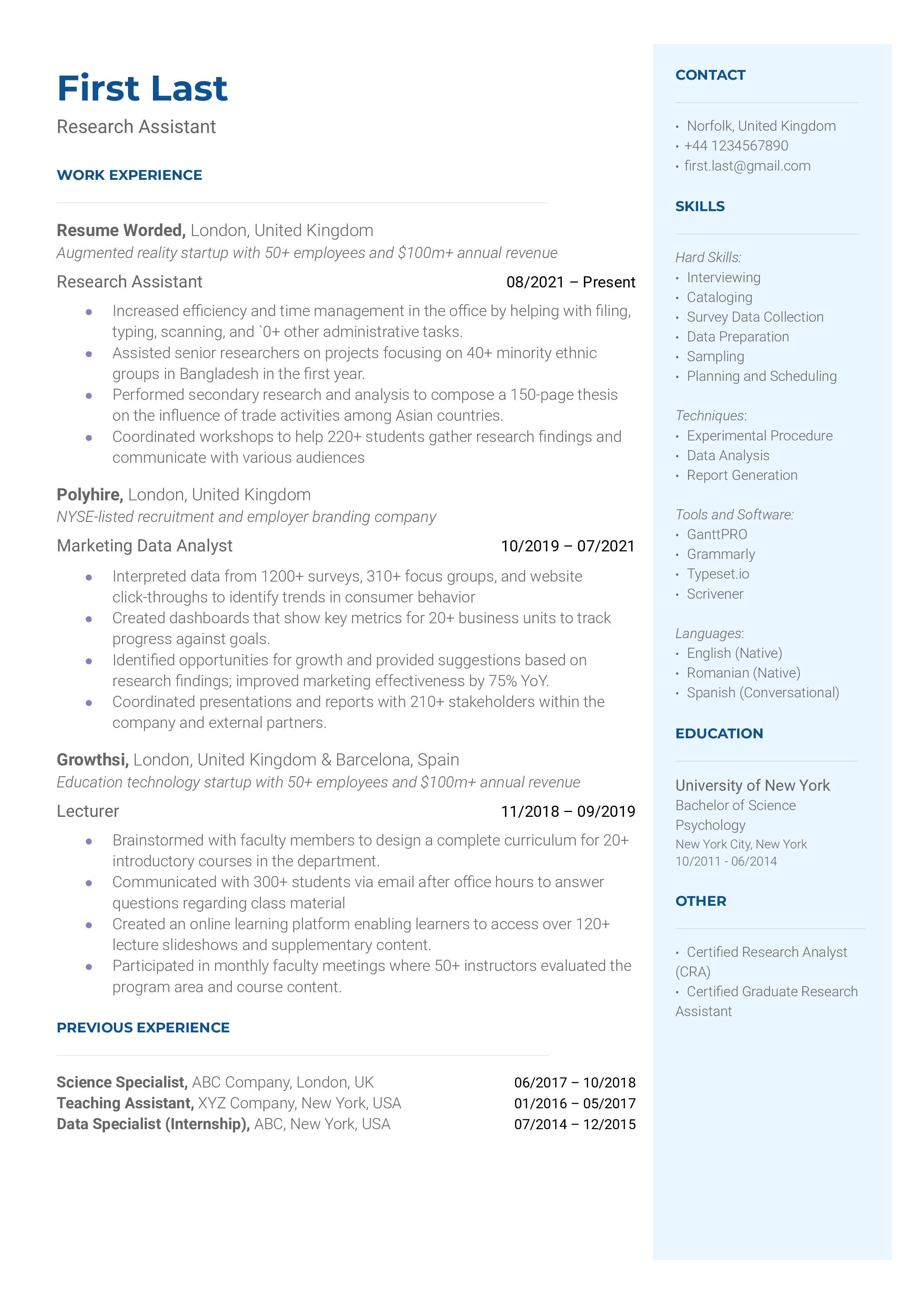
We're just getting the template ready for you, just a second left.
Tips to help you write your Research Assistant resume in 2024
tailor your resume to the industry you want to work in as a research assistant.
Research assistants are needed in a variety of fields from marketing to medical devices. Since this job title can be so broad, it’s important to tailor your resume to the type of research you want to do. For example, if you want to become a research assistant in the field of biology, you should highlight relevant coursework and work experience you have working in medicine, healthcare, or biology.
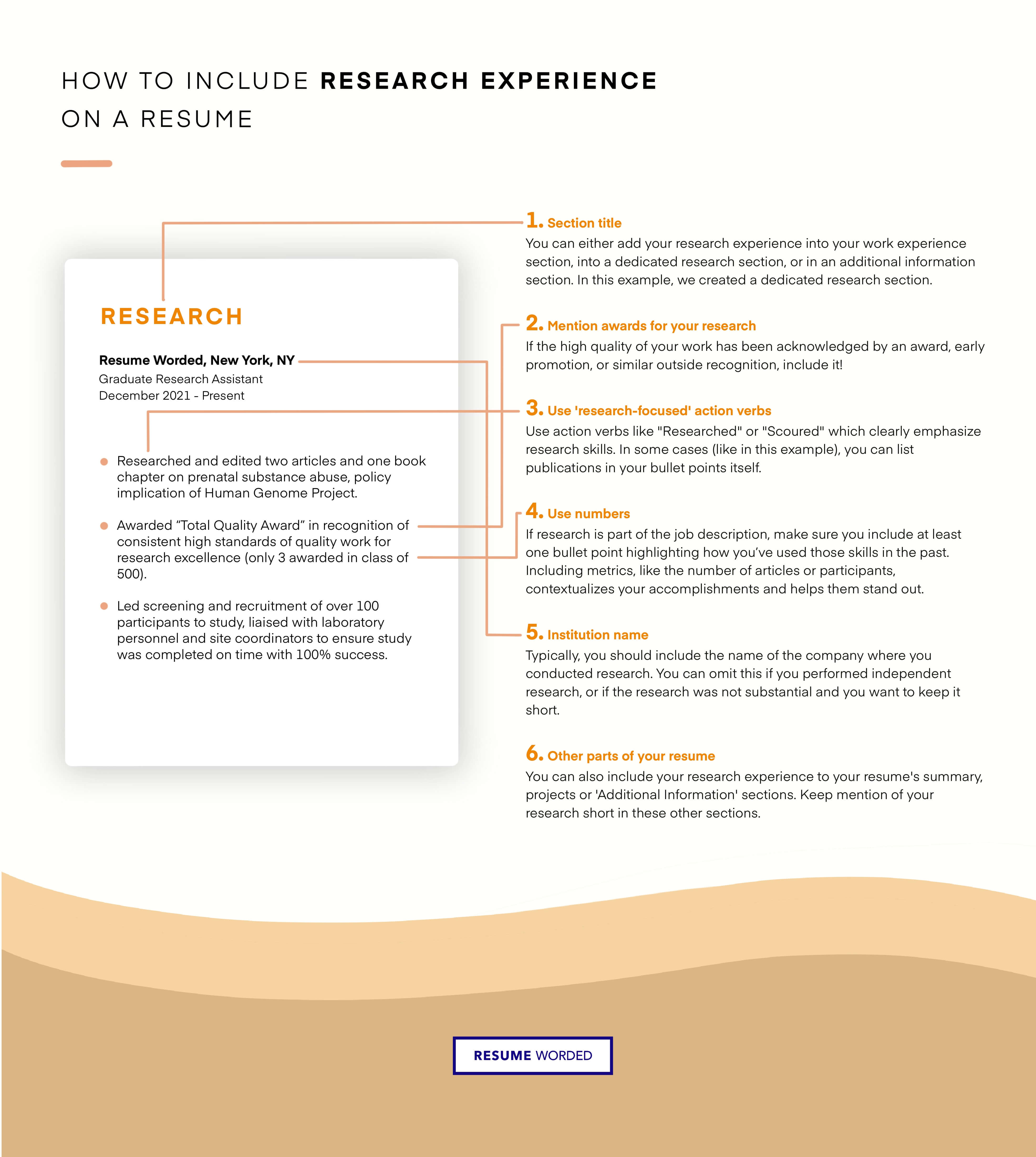
Obtain certifications to stand out
If you are trying to get a research assistant job directly out of college, certifications can help show hiring managers your knowledge in a comprehensive fashion. You can obtain credentials like the CRA (certified research assistant) and highlight it on your resume.
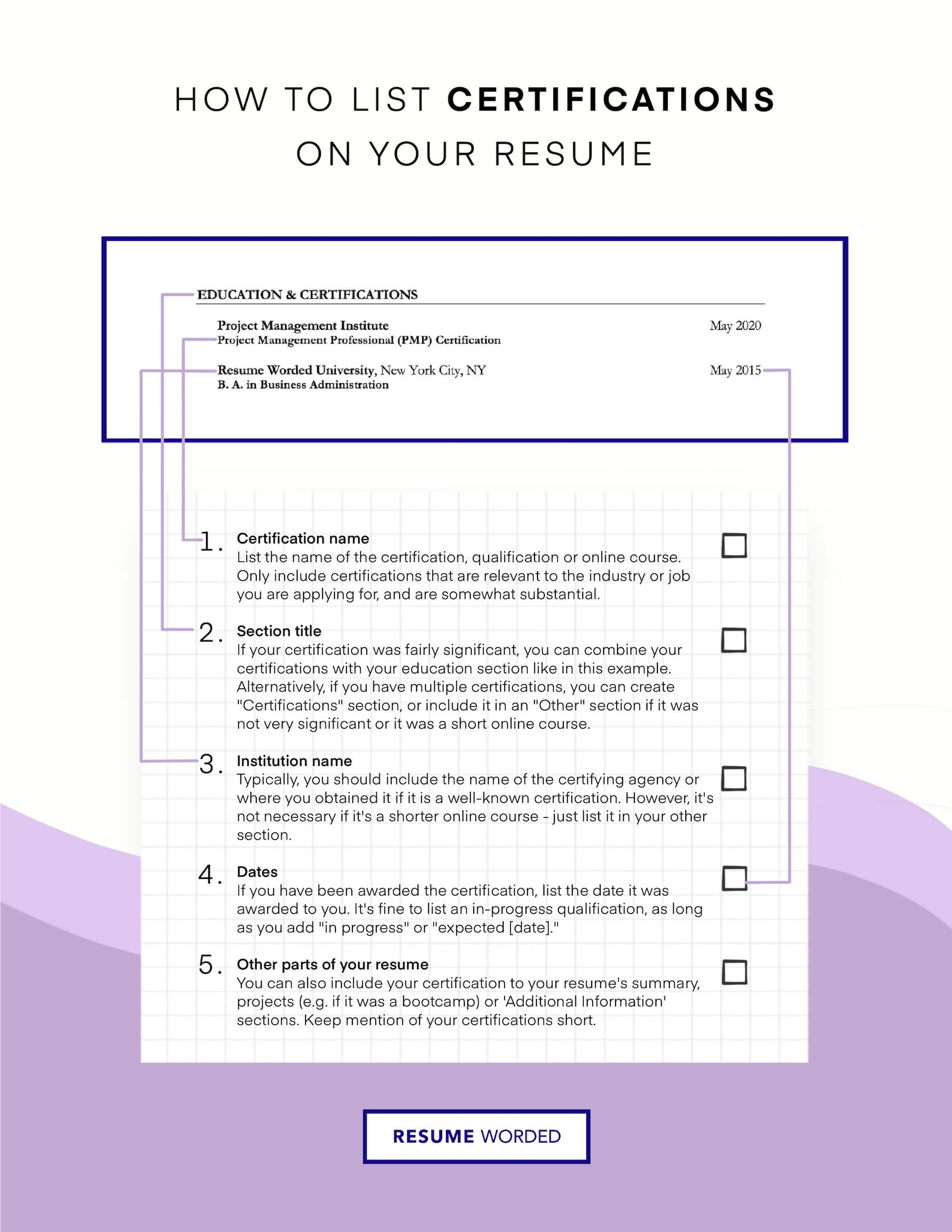
Skills you can include on your Research Assistant resume
Template 2 of 11: research assistant resume example.
The duties of a research assistant will vary depending on the field you’re working in, but will almost always include planning research projects, reviewing literature, writing proposals and grant applications, conducting interviews and surveys, developing statistical models, analyzing data, producing reports, and presenting research findings. While research assistants can be found in just about any academic field, they all share a need for communication, critical thinking, and problem solving skills.
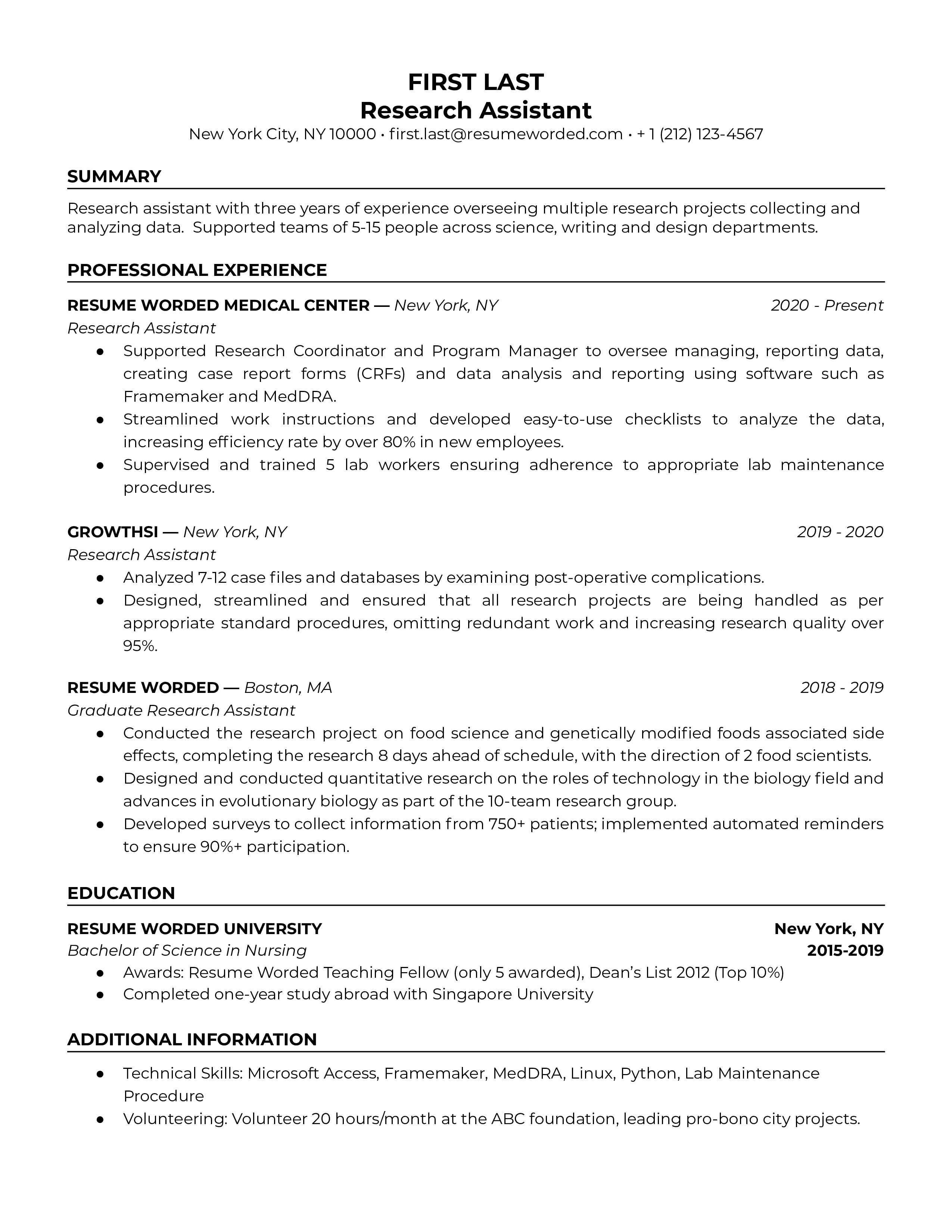
Tailored to the research assistant job
Your resume needs to be tailored to the job you’re applying for — every time. There are plenty of ways to do this quickly and easily, like adding a resume title, using the exact title of the position you’re applying for, and writing a quick resume summary that highlights your most relevant achievements.
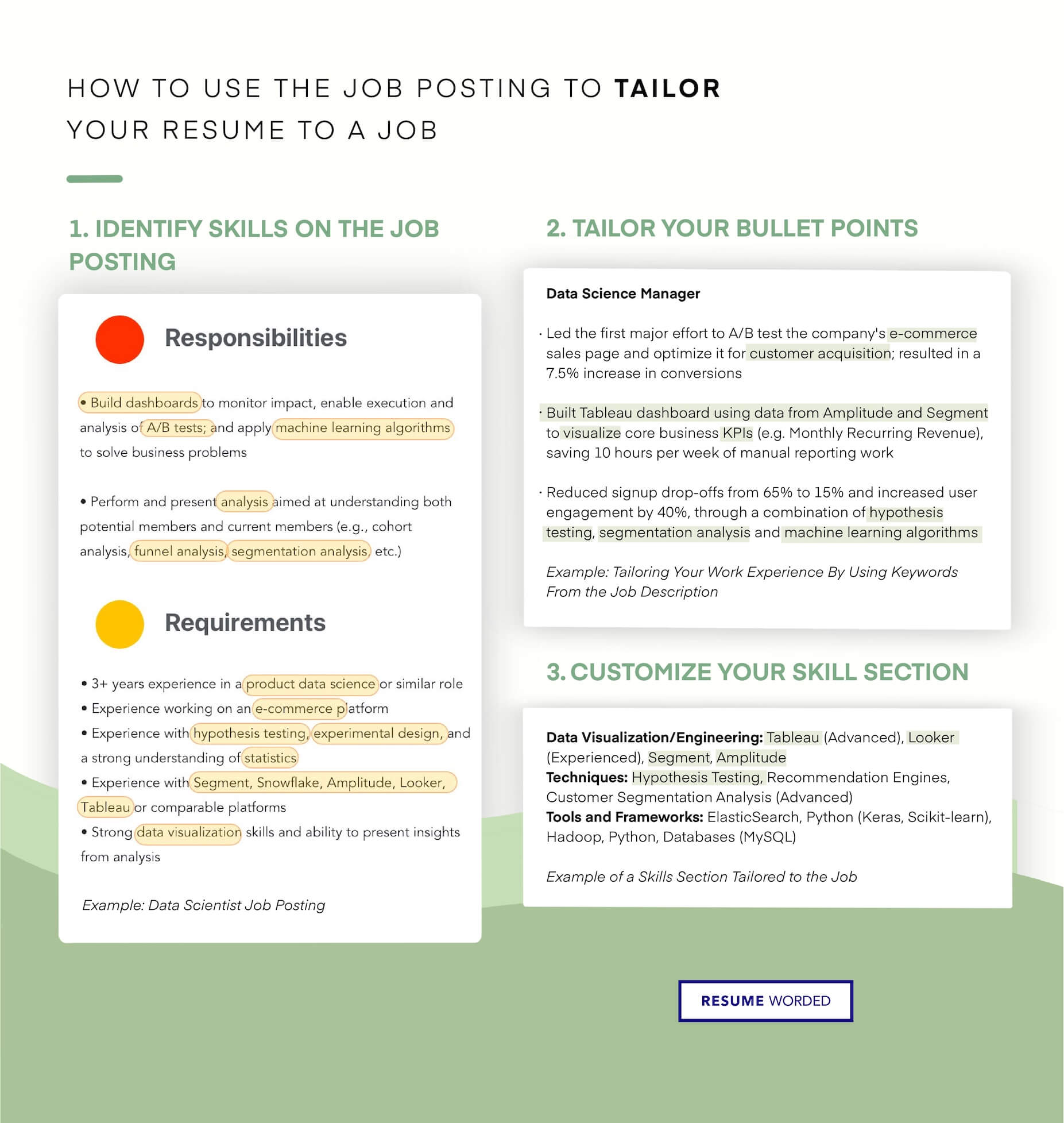
Demonstrates research skills through accomplishments
When listing your skills at the end of your resume, stick to hard skills only. If you want to emphasize soft skills, you can do this through your bullet points instead. Accomplishments like “streamlined work instructions and developed easy-to-use checklists” show attention to detail, while “developed surveys to collect information and implemented automated reminders” highlights problem solving and communication skills.
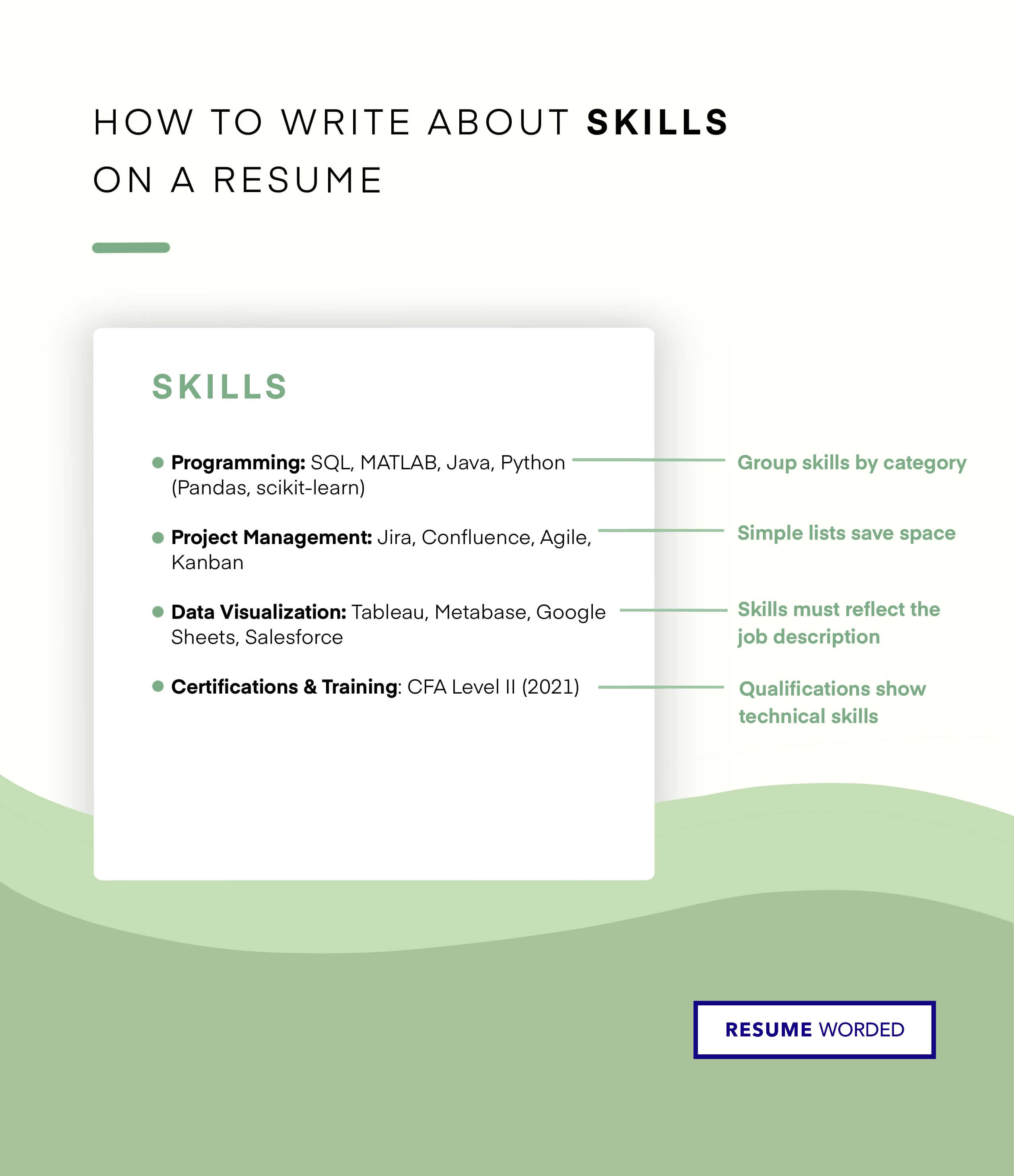
Template 3 of 11: Clinical Research Assistant Resume Example
As a Clinical Research Assistant, your role is focused on supporting the clinical research process, which may include tasks like data collection, management, and analysis. In recent years, the emphasis on data-driven discoveries and the use of technology in research have become prevalent trends in this field. When writing your resume, it's important to highlight the specific skills and experience that make you a strong candidate for this specialized role. In addition to demonstrating your knowledge of research methodologies, it's essential to showcase your expertise in relevant software and technologies, as well as emphasizing your attention to detail and organizational skills. These qualities are crucial for a Clinical Research Assistant, as they directly impact the success of the research projects you'll be working on.
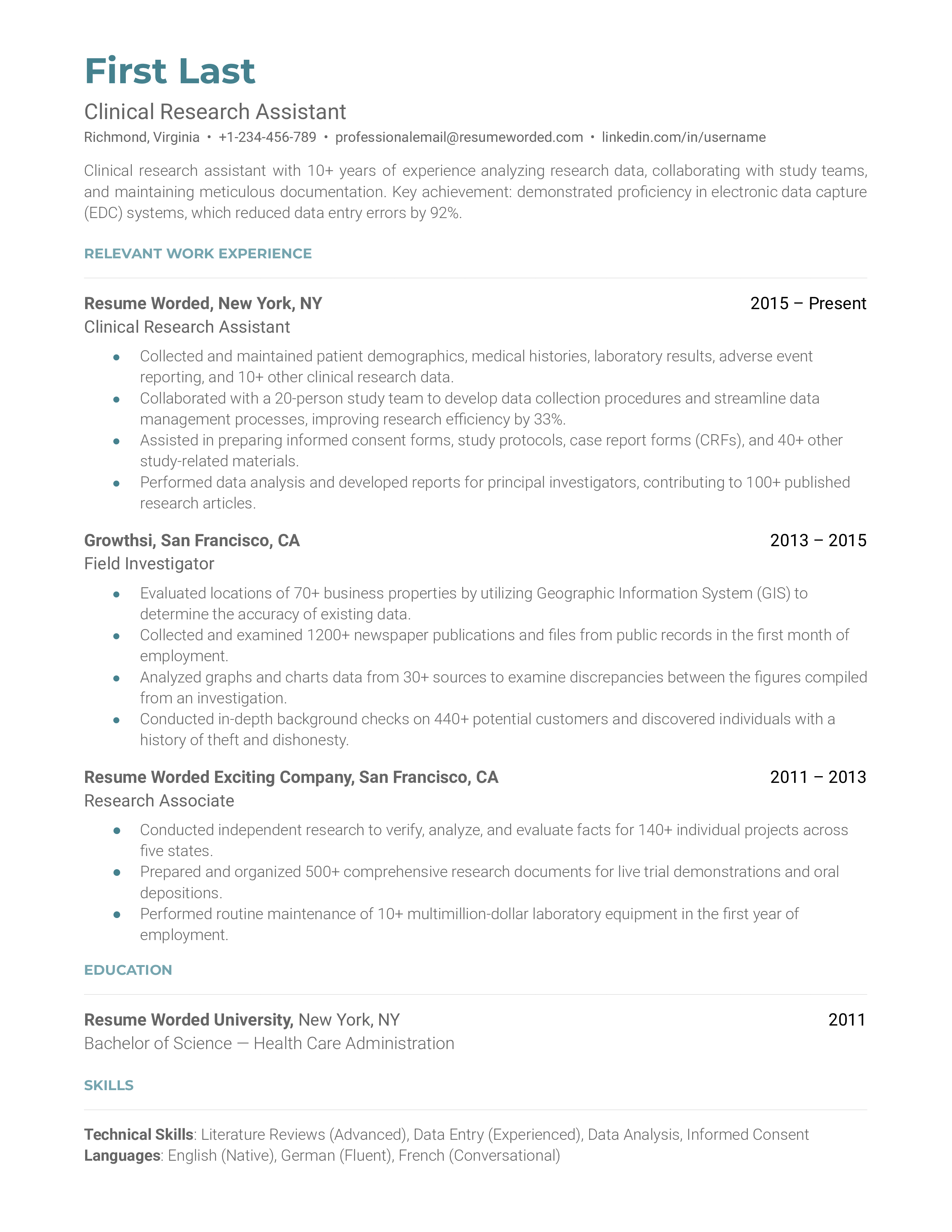
Tips to help you write your Clinical Research Assistant resume in 2024
highlight relevant experience.
Make sure you highlight any experience that demonstrates your ability to work on clinical research projects, whether it's through internships, volunteer work, or previous employment. This could include data collection, analysis, or managing research databases.
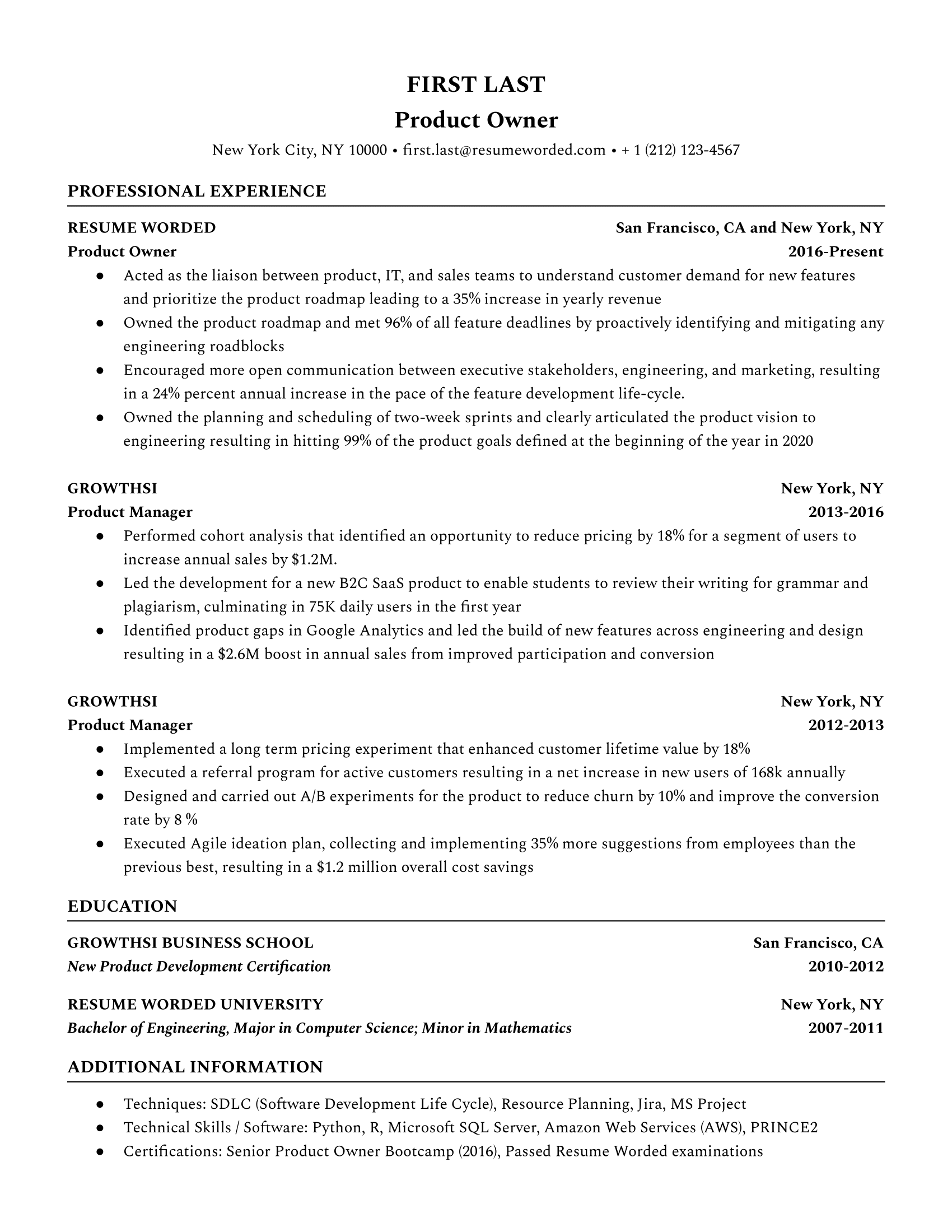
Showcase specific skills and certifications
As a Clinical Research Assistant, proficiency in tools like statistical software (e.g., SPSS, SAS), electronic data capture systems (e.g., REDCap), and other relevant programs is essential. List any certifications you've earned (e.g., Good Clinical Practice) to further demonstrate your expertise in this field.
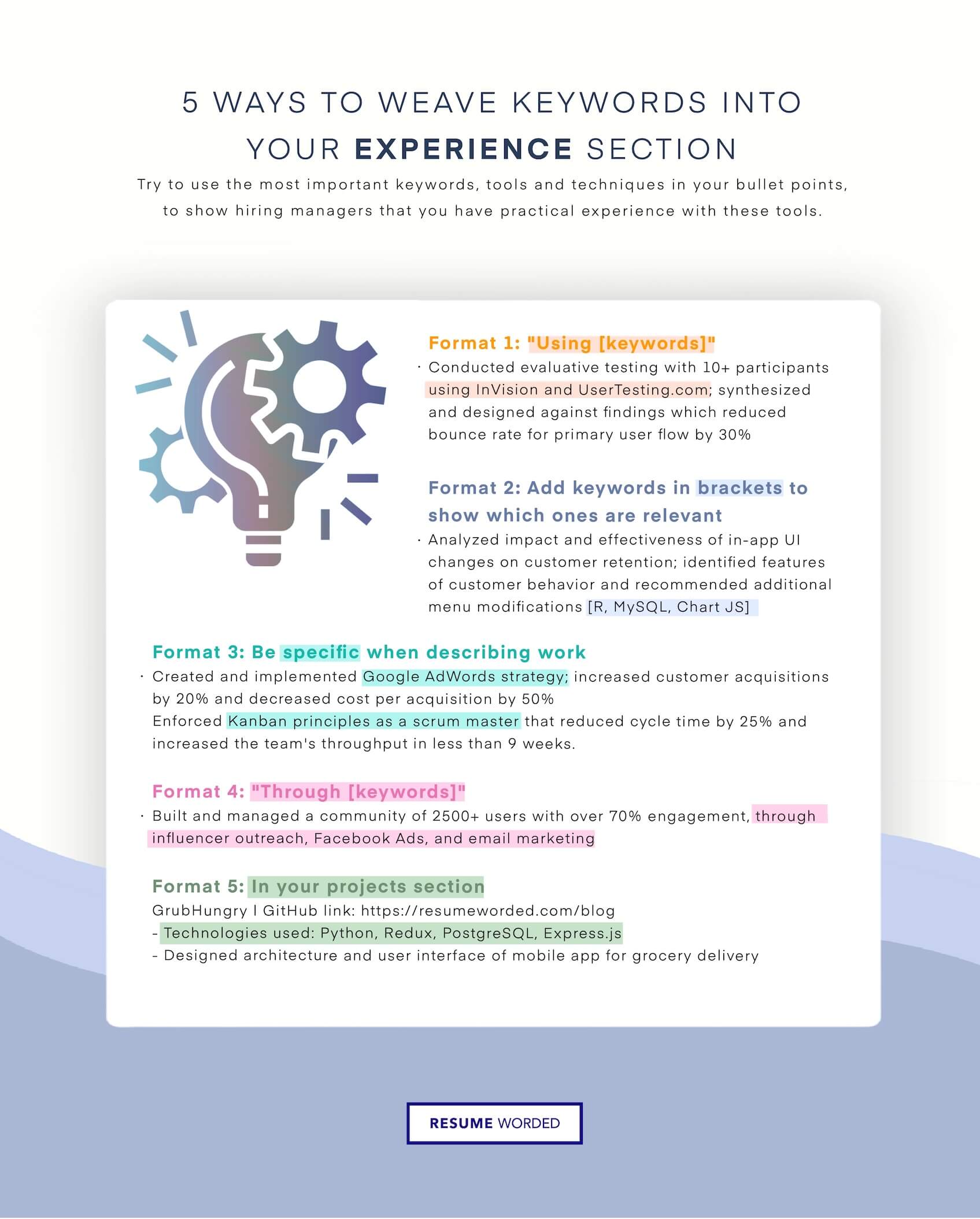
Skills you can include on your Clinical Research Assistant resume
Template 4 of 11: clinical research assistant resume example.
Clinical research assistants work on clinical trials in hospitals and medical research centers. As a clinical research assistant, you’ll be assisting doctors and senior researchers by recruiting and enrolling research subjects, developing protocols, setting up and managing trials, collecting and analyzing data, and contributing to trial reports, regulatory authority applications, and grant writing. Ideally, you’ll need some experience or a degree in the field of study and clinical trial experience.
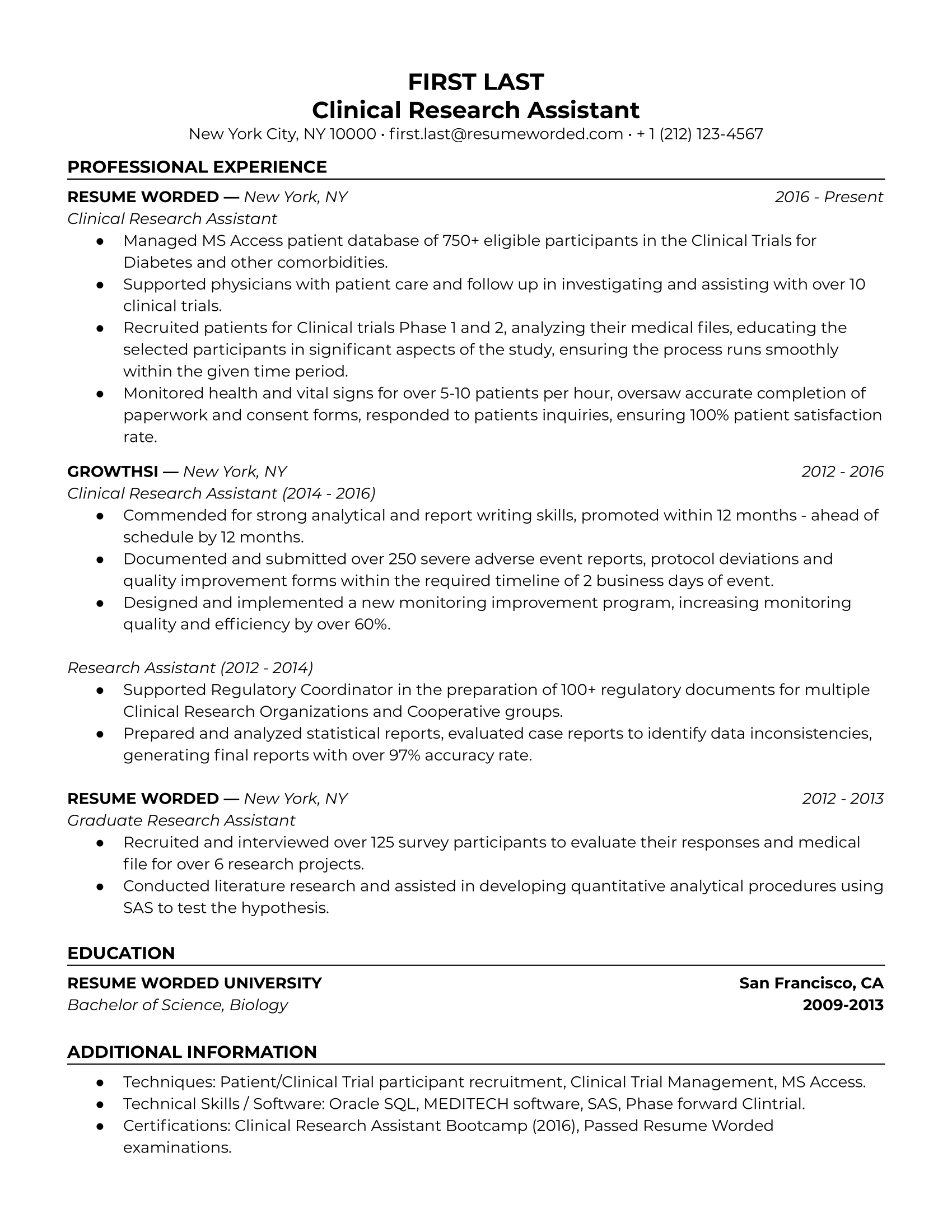
Focused on clinical research
When applying for a more specialized position like clinical research assistant, you want to keep your resume as tightly focused as possible. That means prioritizing clinical research experience. It’s fine to include general research experience, but try to tailor your bullet points by including accomplishments relevant to clinical research, like preparing regulatory documents and conducting medical research.
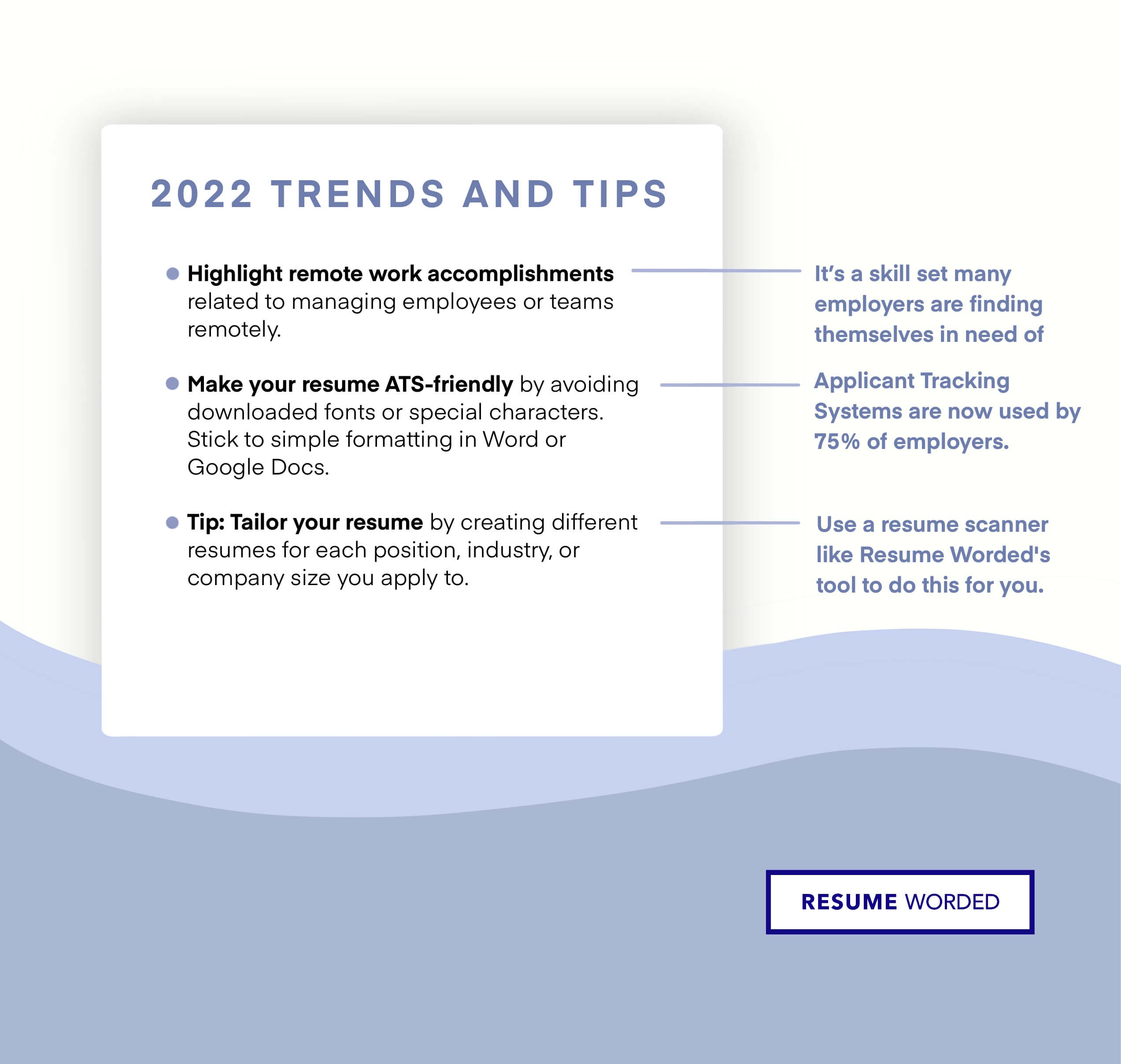
Good use of skills section to highlight research skills and tools
Jobs that require a lot of hard skills, like clinical research, may end up with a larger than usual skills section. Avoid making recruiters’ eyes glaze over by splitting it into subsections, like certifications, techniques, and technical skills. Make sure you’re exclusively listing hard skills — employers want to see things like relevant software skills and clinical trial experience.
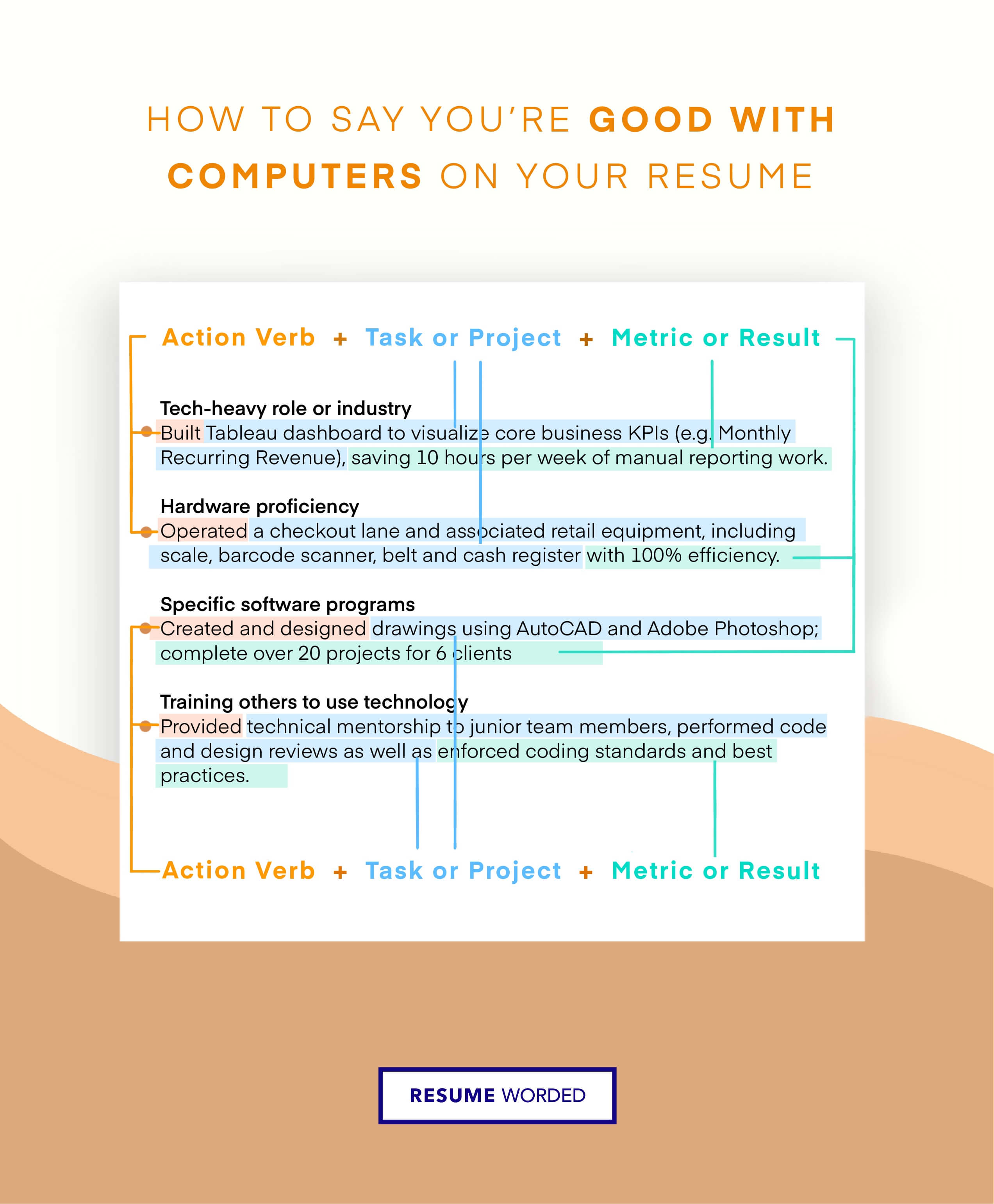
Template 5 of 11: Laboratory Research Assistant Resume Example
As a Laboratory Research Assistant, you're part of the backbone of scientific exploration. Your role is hands-on and often behind-the-scenes, contributing to scientific knowledge and advancements. When it comes to your resume, remember just how crucial your role is - you're not just a cog in the machine, but an active participant in the process of discovery. One recent trend in the industry is the growing importance of computational skills. This role isn't just about pipettes and petri dishes anymore - increasingly, labs want assistants with a knack for data analysis and bioinformatics. Make sure to highlight these skills on your resume. Show them you're not just a traditional lab rat, but a 21st century researcher.
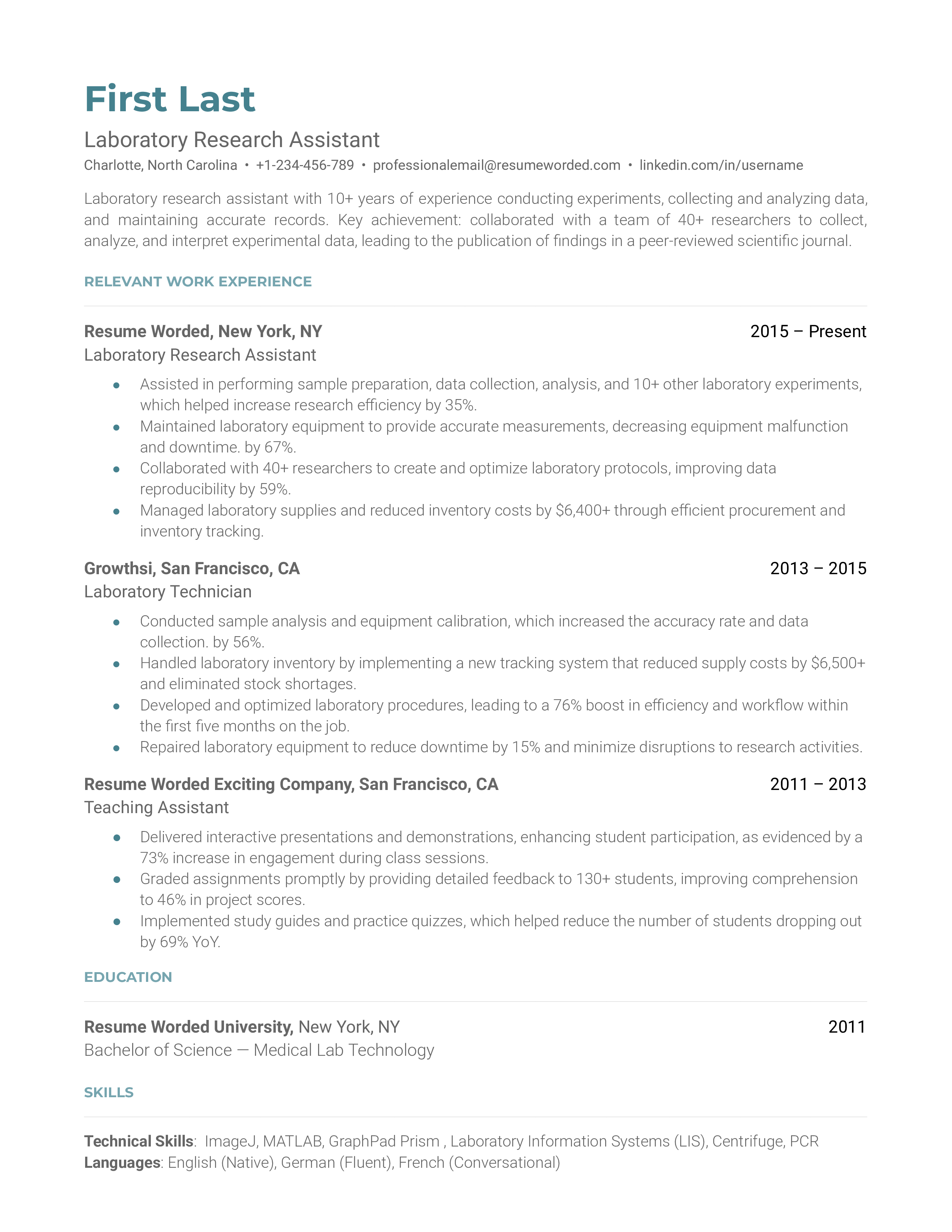
Tips to help you write your Laboratory Research Assistant resume in 2024
highlight specific lab skills.
In a sea of resumes, yours should stand out by pinpointing the unique lab skills you possess. Mention precise techniques you’re proficient in, like PCR, cell culture, spectrophotometry, etc. It proves you're not just familiar with the lab, but you can actually get things done.
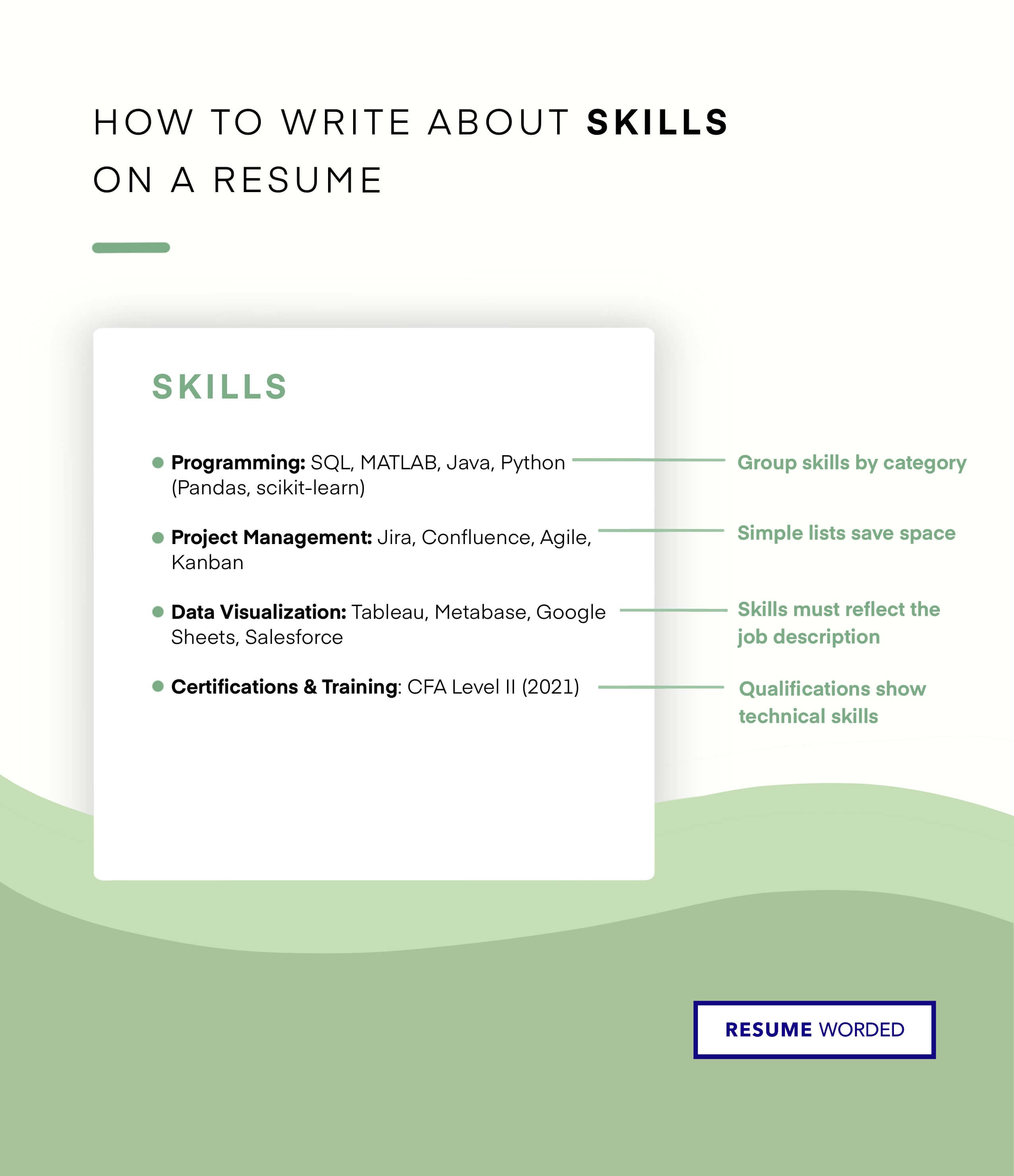
Showcase Computational Skills
Lab work has gone digital! Highlight your proficiency in data analysis or bioinformatics. Show them you can handle complex datasets, understand predictive modeling, or have experience with research software like SPSS or Python. Excite them with your digital prowess.

Skills you can include on your Laboratory Research Assistant resume
Template 6 of 11: laboratory research assistant resume example.
As a laboratory research assistant, you’ll be working in a laboratory environment to design projects, conduct research and experiments, write reports, perform general laboratory maintenance, and assist senior laboratory staff — so make sure to emphasize your technical skills. You may be working for a private laboratory, medical or research facility, or pharmaceutical company. Unlike standard research assistant positions, lab assistants typically work full-time, including weekend and evening shifts.
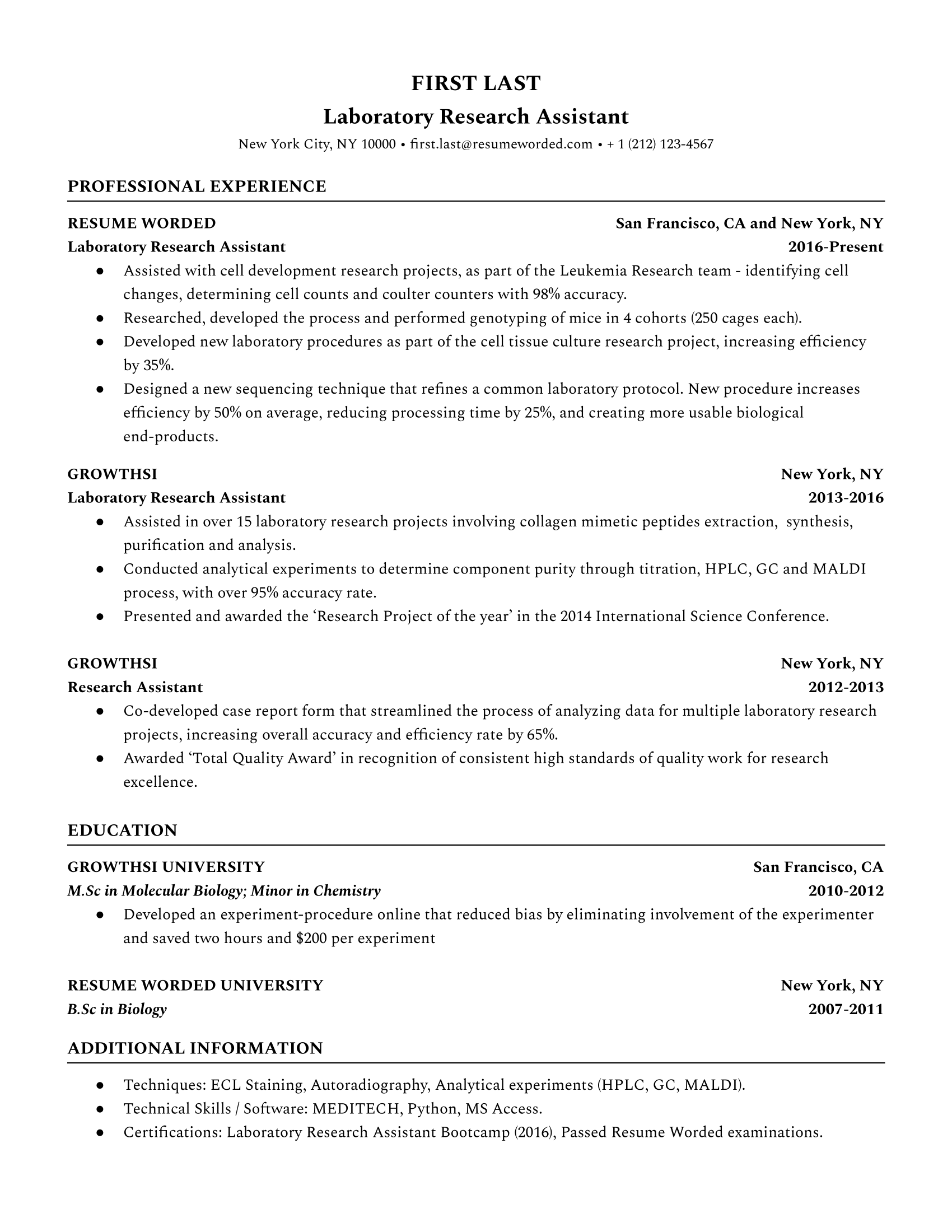
Bullet points feature strong action verbs
Every bullet point should start with a strong action verb. Remember, your resume is supposed to highlight your accomplishments, not simply list your job duties. As a laboratory research assistant, you’ll want to emphasize your scientific expertise. Verbs like Researched, Designed, and Developed all reflect the skills you’ll be expected to use on the job.
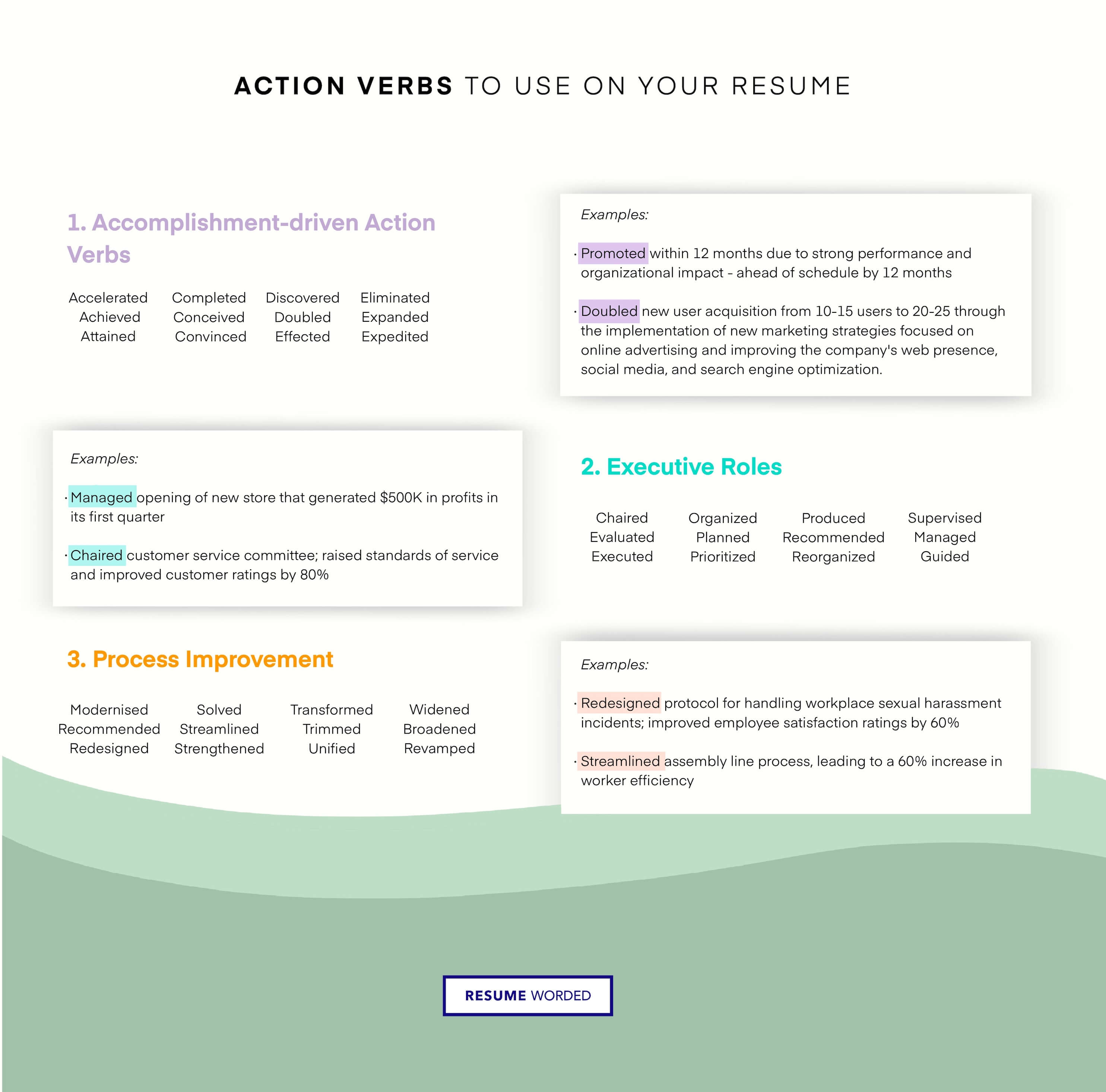
Uses hard numbers and metrics
Including metrics in your bullet points is the best way to demonstrate the outcome of your work. This doesn’t mean every bullet point needs to include numbers but try to quantify your accomplishments whenever possible. If you analyzed data with 98% accuracy, reduced processing times by 25%, or performed research on 1,000 subjects, say exactly that.
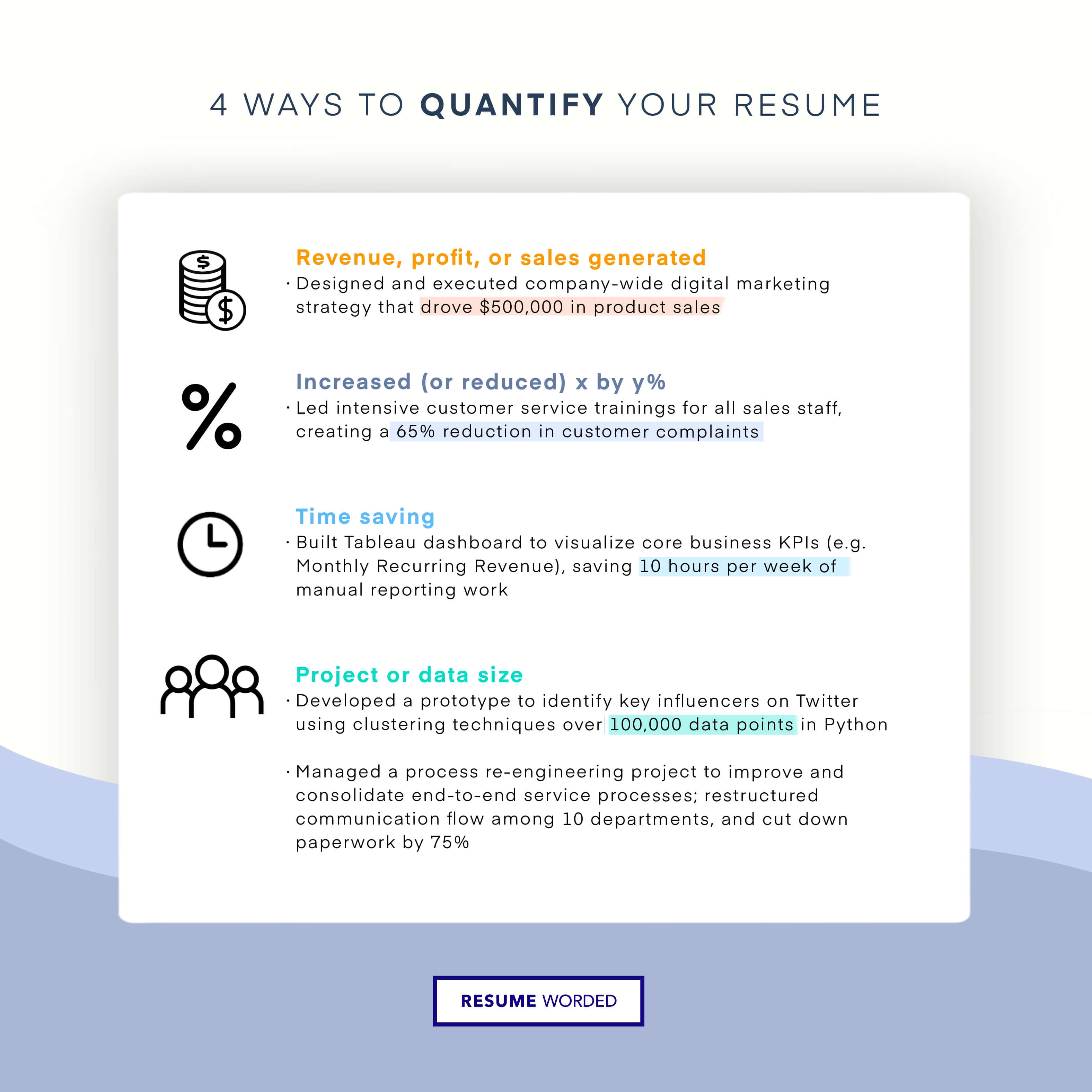
Template 7 of 11: Graduate Research Assistant Resume Example
A graduate research assistant is typically someone carrying out research as part of their master’s or PhD program. Graduate research positions can be found in a variety of fields and disciplines. Usually, graduate research assistants help conduct experiments, research, and collect data for a university department or professor. They may also help teach undergraduate lectures in their field of study. To become a graduate research assistant, you usually must be pursuing a continuing education degree, such as a master’s degree. Typically, students will hold these positions at the university they attend. You must also have a strong academic track record. Professors will look to hire graduate research assistants who are well-versed in their area of study. Moreover, graduate research assistants must be highly organized because these roles are held simultaneously alongside their coursework.
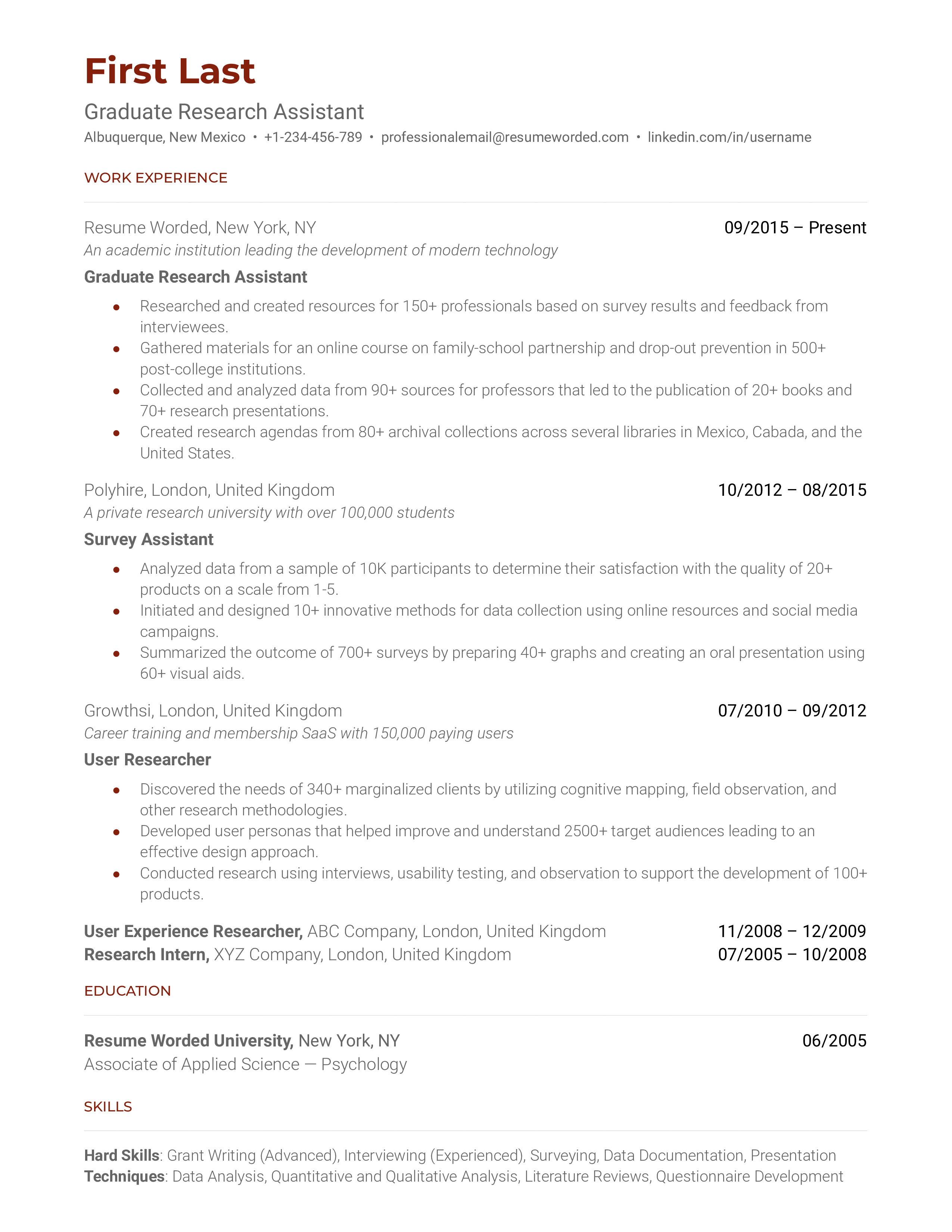
Tips to help you write your Graduate Research Assistant resume in 2024
showcase your ability to compile data and create reports.
Regardless of the field, graduate research assistants can expect to have to compile data and present it efficiently. For this reason, it’s important to highlight projects where you have had to compile various sets of data and information, and had to synthesize it to create a comprehensive report. You can use examples from your undergraduate degree.
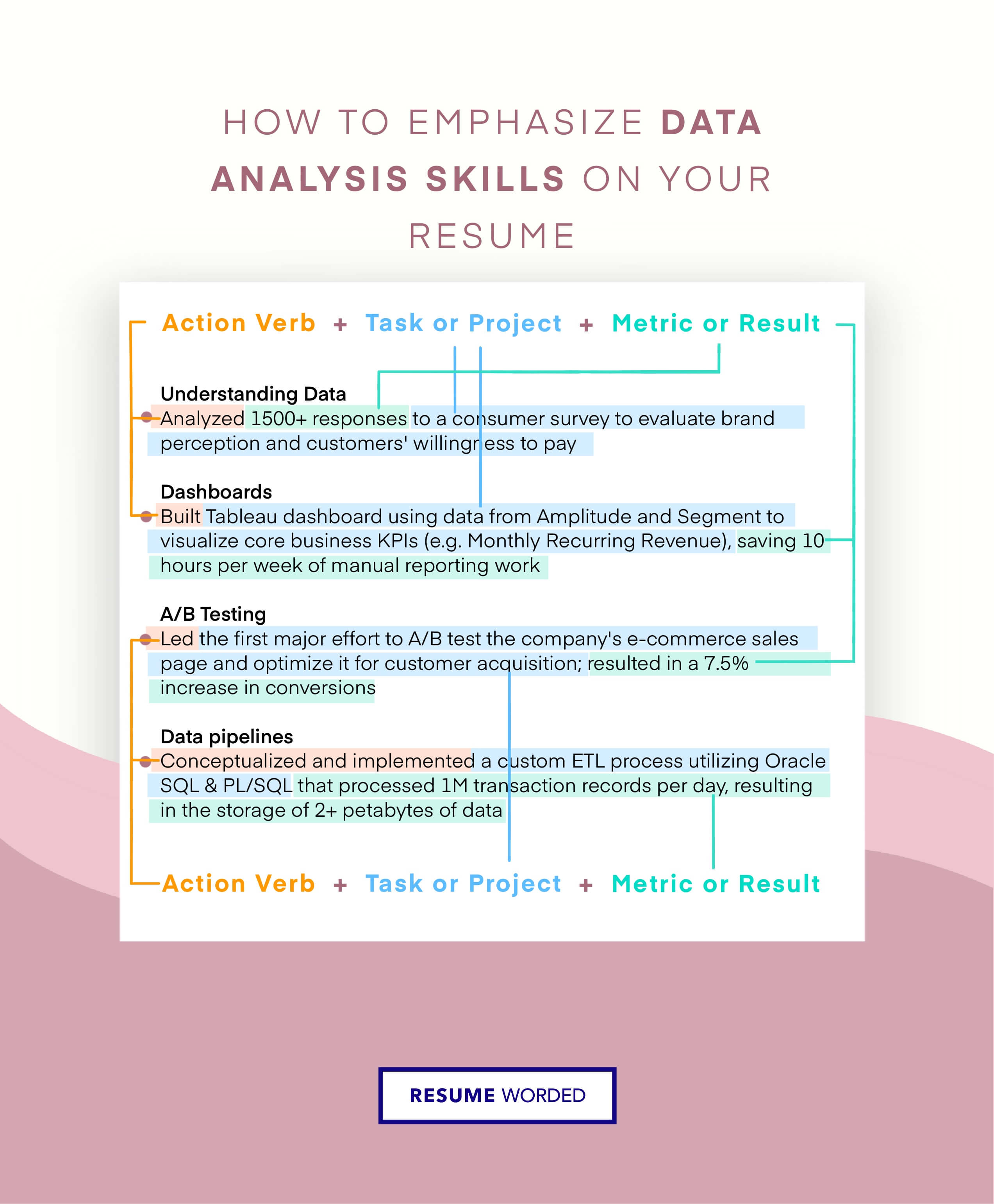
Detail your expertise and passion for your chosen field
Graduate research assistants typically work in the field they are studying. As such, it’s important to show you are knowledgeable and enthusiastic about the field. If you can highlight any achievements you enjoyed during your undergraduate studies, such as awards, leading student clubs, or earning honor roll - it will show you are committed to your specific field of study.
Skills you can include on your Graduate Research Assistant resume
Template 8 of 11: graduate research assistant resume example.
Graduate research assistants are able to work while they study, receiving a tuition reimbursement or stipend as well as valuable experience working in academia. As a graduate research assistant, you’ll have completed an undergraduate degree and be pursuing a master’s degree or PhD. You’ll generally be working closely with a supervisor to support their projects, including conducting research, analyzing data, writing reports, and supervising undergraduate research assistants.
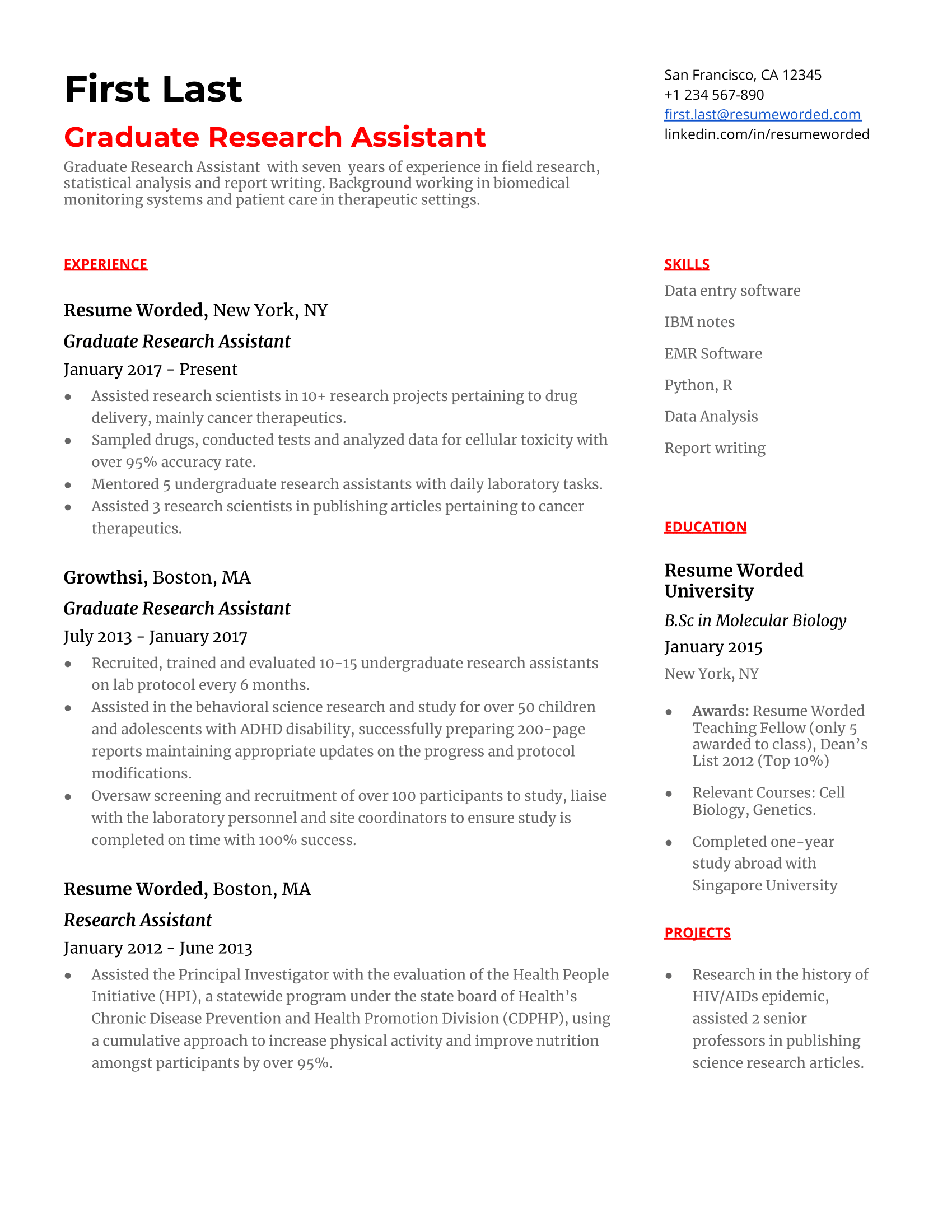
Highlights university research projects
As a graduate research assistant, hiring managers won’t expect you to have extensive paid experience. If you’ve worked on previous research projects as a student, you can list these under your work experience or in an education or projects section. For greater impact, use action verbs and metrics to frame your accomplishments in an action-focused way.
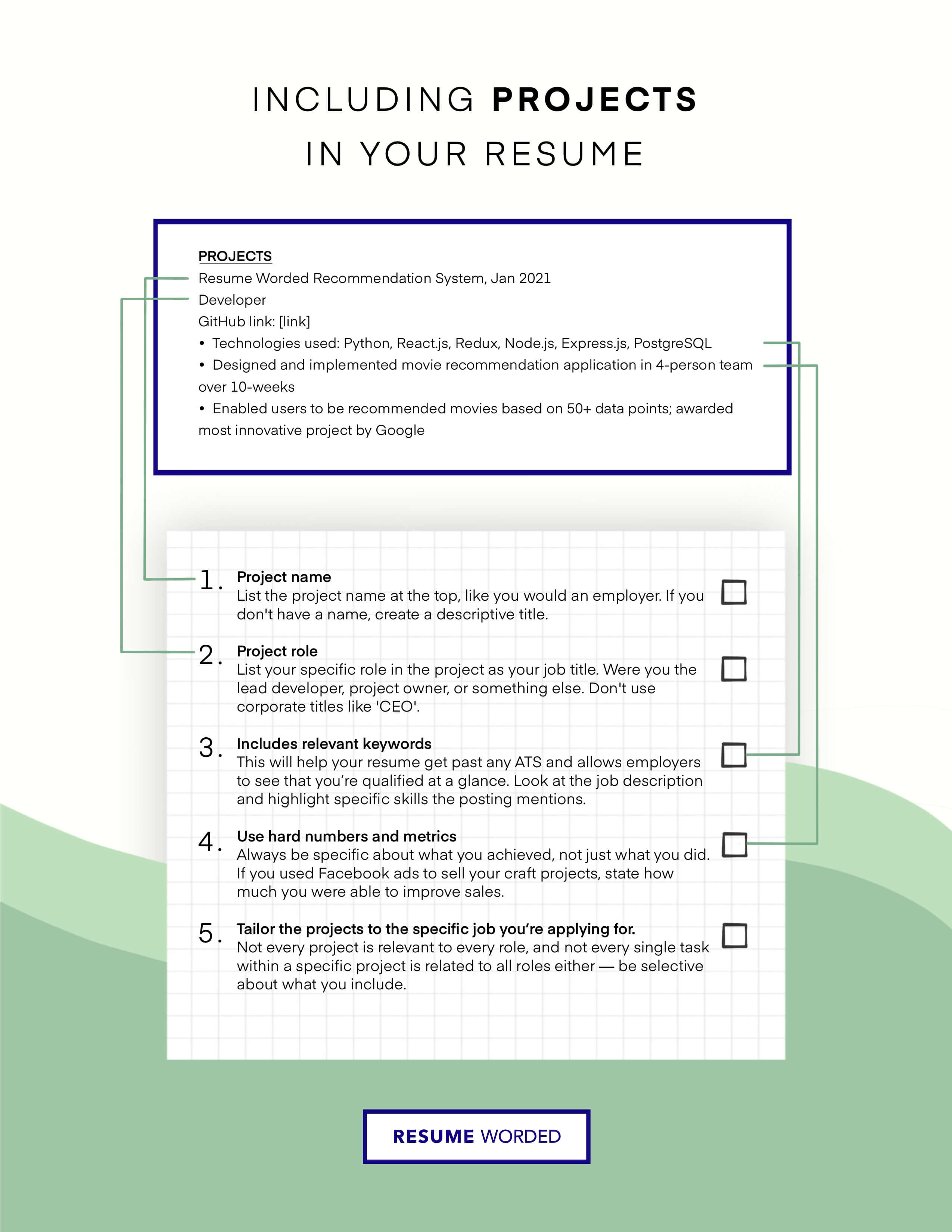
Includes a resume summary focused on graduate research interests and experience
Even as a graduate, you may have significant research experience, especially if you’ve been heavily involved in student research. You can highlight your skills and background with a short resume summary — no more than 100 words — explaining your years of experience, research or educational specialization, and 1-2 of your most impressive accomplishments.
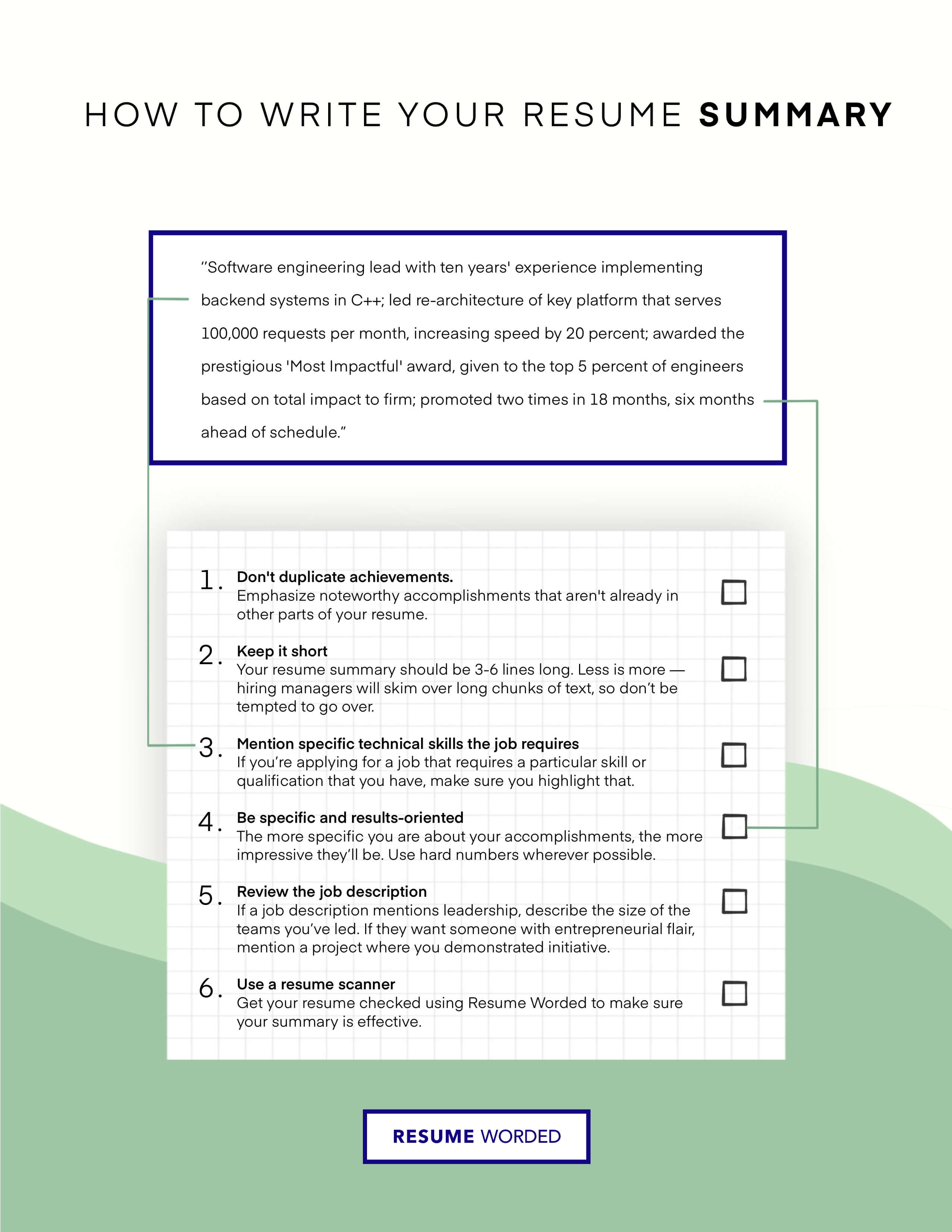
Template 9 of 11: Undergraduate Research Assistant Resume Example
An undergraduate research assistant is someone who assists in the act of executing experiments, collecting data, and executing analysis of data collected. Typically, the undergraduate research assistant is guided by a master's student or postdoctoral researcher, who guides the undergraduate research assistant. To land a job as an undergraduate research assistant, you’ll need strong attention to detail, superb communication skills, and critical thinking abilities. Hiring managers for the position will be looking to see relevant experience, whether that be coursework, research reports you’ve published, and relevant internship and/or past job experience. Technical skills developed through relevant coursework, such as technical writing and quantitative research, should be noted on your resume.
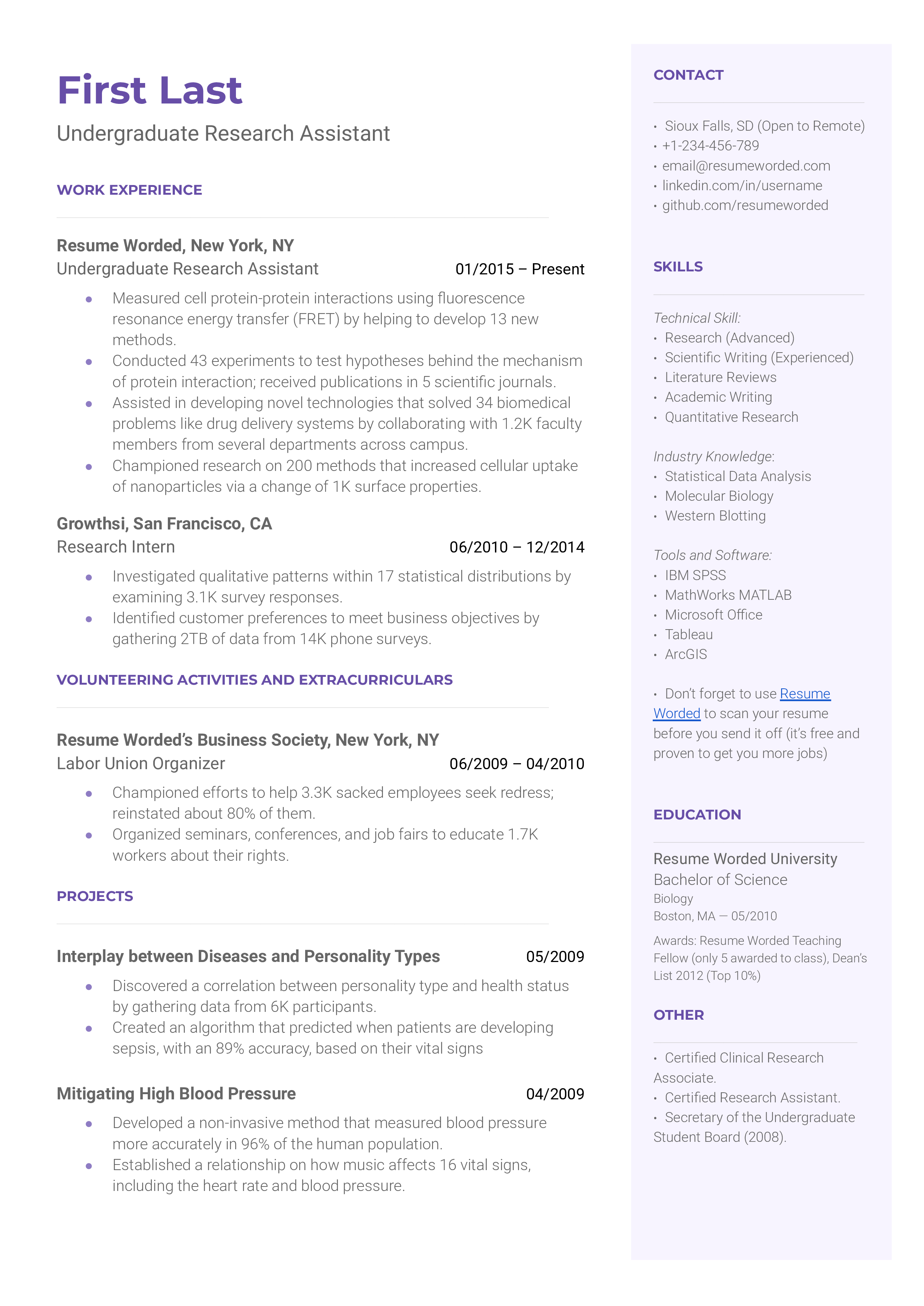
Tips to help you write your Undergraduate Research Assistant resume in 2024
apply to research assistant positions that intersect with your field of study.
To get an undergraduate research assistant position, hiring managers will be interested in candidates with relevant knowledge to the subject matter they research. If you have a psychology degree, you should apply to work in departments that primarily conduct research having to do with the brain. You will be better able to utilize your knowledge with experiments that relate to your chosen field.
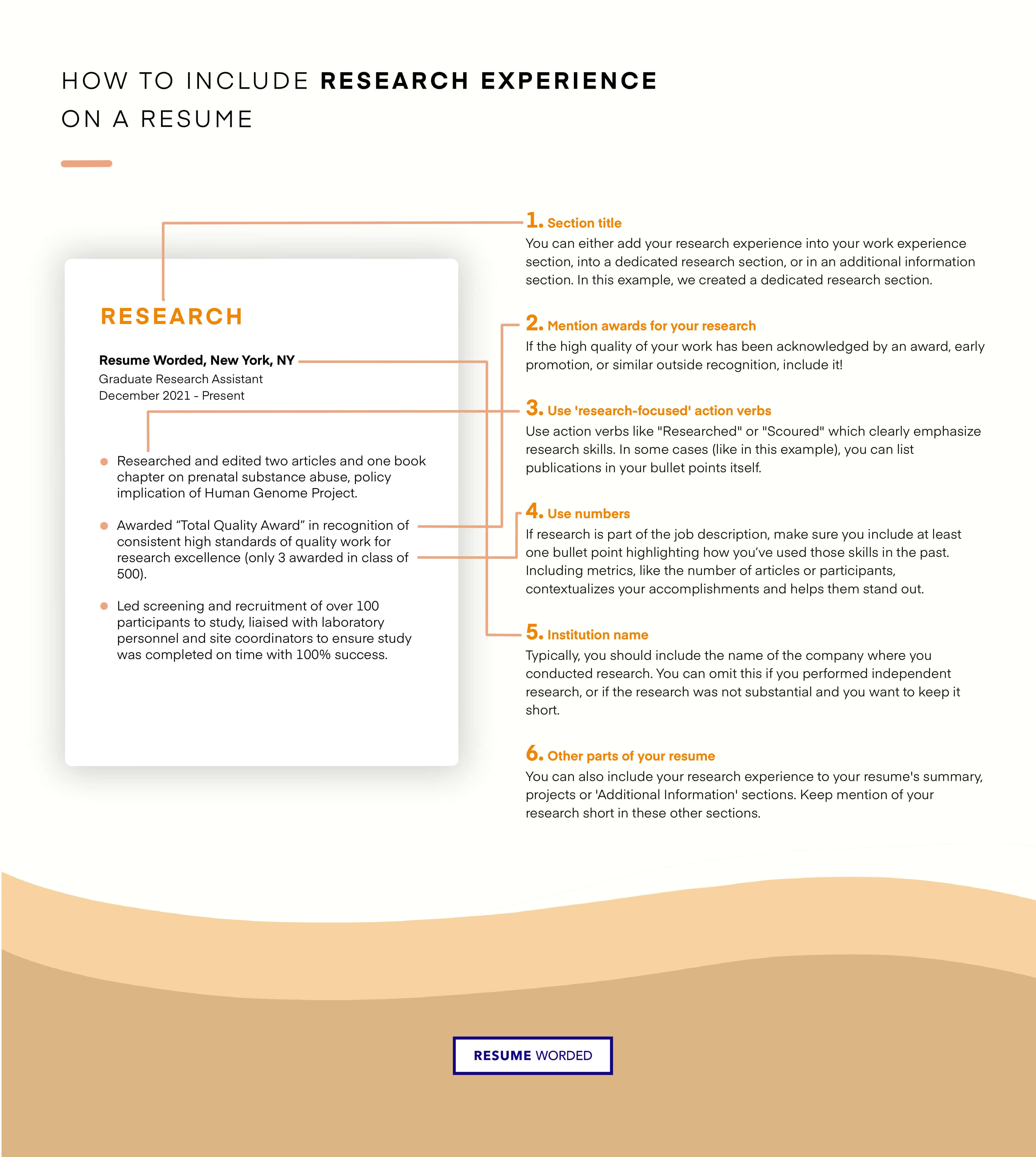
Highlight previous projects or research you have completed
Showcasing that you are able to write using scientific and technical principles will go a long way when trying to get an undergraduate research assistant position. You should make note of any published writing or research you’ve done in your resume. Being able to showcase the relevant technical skills you have will catch the eye of hiring managers.
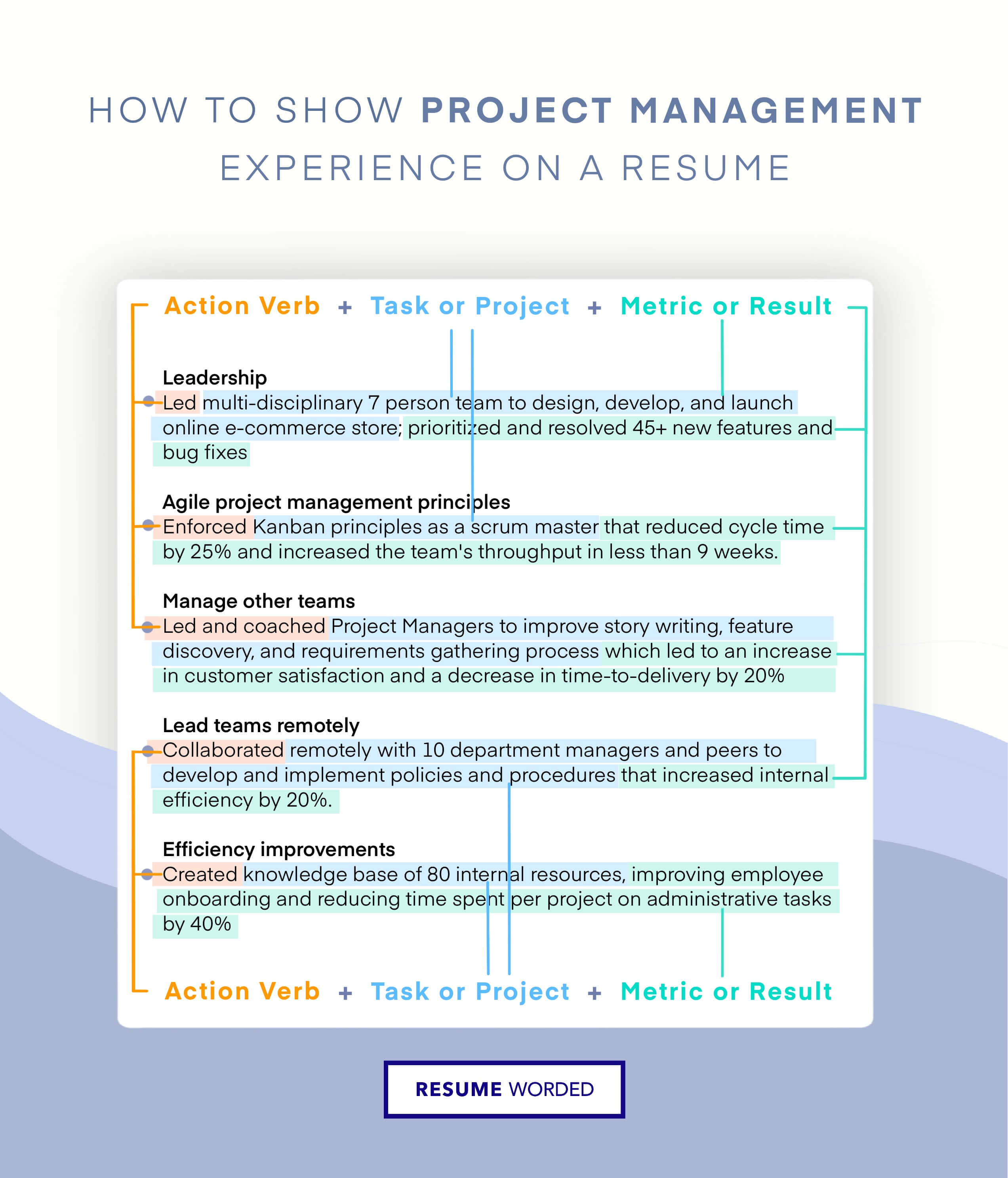
Skills you can include on your Undergraduate Research Assistant resume
Template 10 of 11: entry level research assistant resume example.
An entry research assistant is someone who helps prepare studies, conduct them, record findings, and synthesize the information. You may work with undergraduate students who will assist you in conducting studies and learn from your area of expertise. To get a position as an entry level research assistant, you’ll need a strong educational background in science or another technical field. You’ll also need experience assisting with conducting research, great attention to detail, and strong technical writing skills. Usually, people who get roles as entry level research assistants have a combination of relevant education and experiences. Experience using data management tools like SOLIDWORKS and IBM SPSS, as shown in the example resume, is also good to demonstrate.
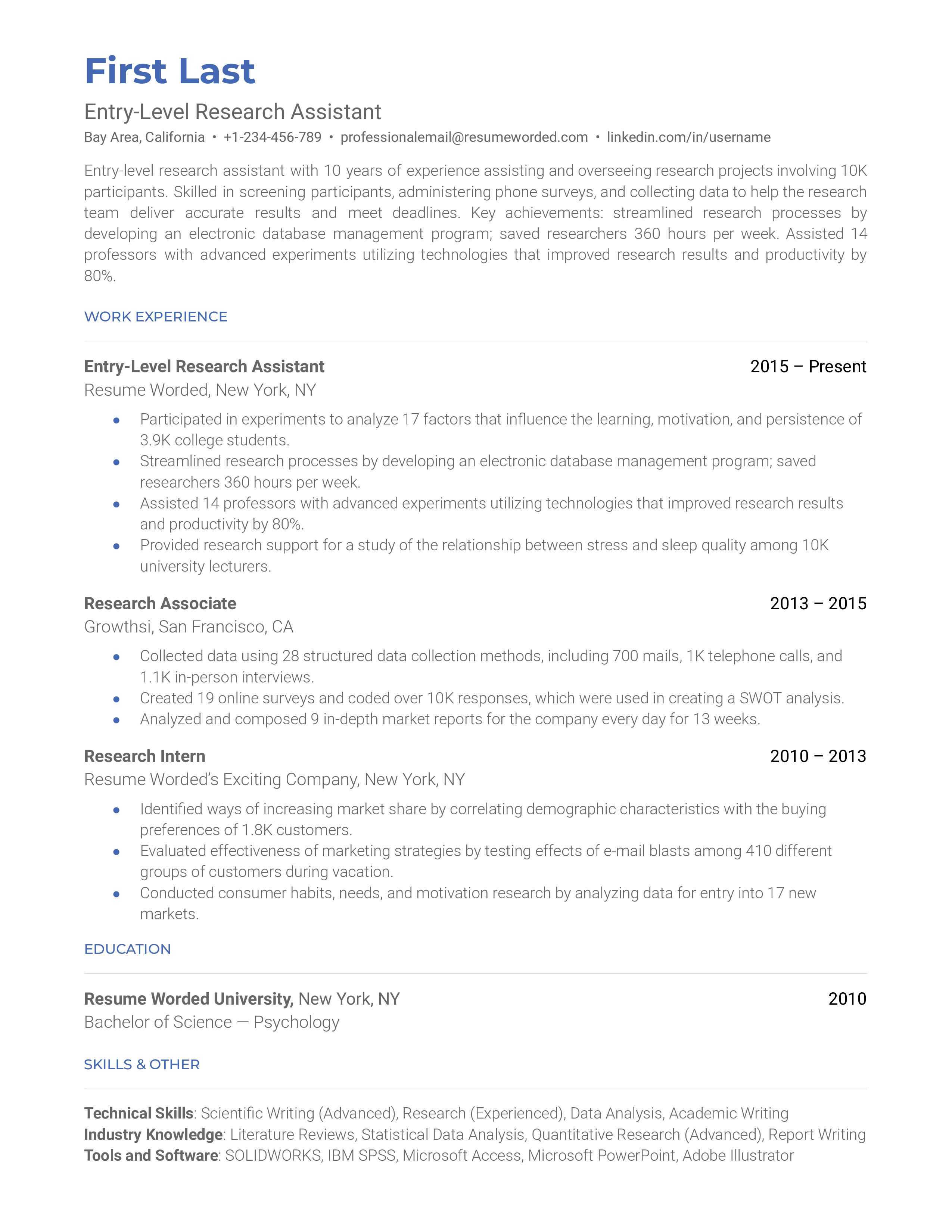
Tips to help you write your Entry Level Research Assistant resume in 2024
show off your knowledge on the topic you will be researching.
To get an entry level research assistant role, it will help if you are familiar with the area of study the lab is focused on. For example, if you know the lab you are applying to mainly studies genetics, you will want to include any relevant educational or research experience you’ve had in the field. This could be academic or past job experience. Showing you are well versed in the area of study you’ll be researching will make you more credible to hiring managers.
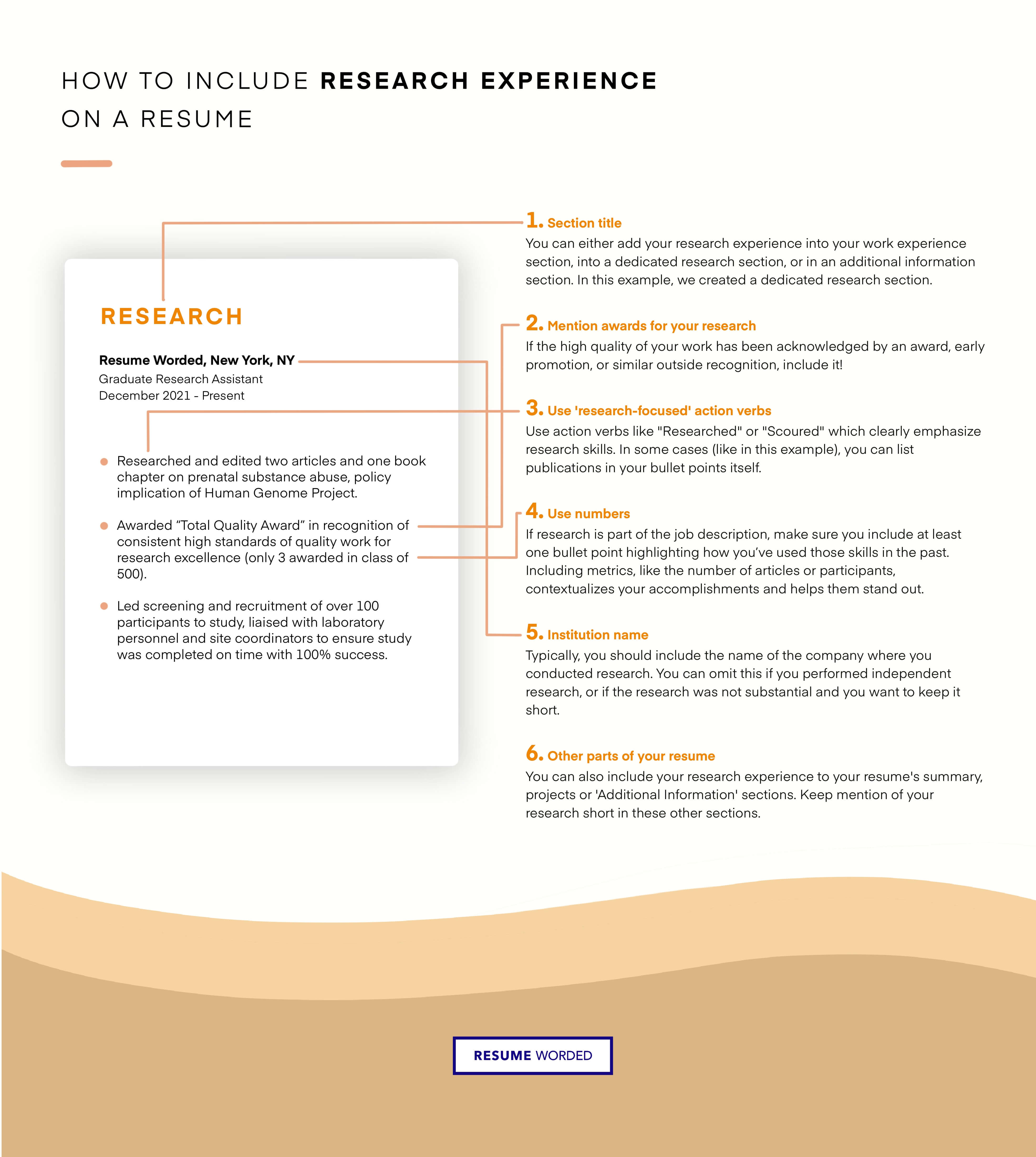
Showcase your experiences that are relevant to being an entry level research assistant
Usually, hiring managers are looking for a specific skill set when it comes to hiring for an entry level research assistant. Some things they might be looking for include experience with scientific writing, composing reports, data analysis, and more. If you can bring up past examples of times you have used relevant skills, such as scientific writing, it will help you land the job. You can use projects completed in an academic setting if you do not have relevant work experience.
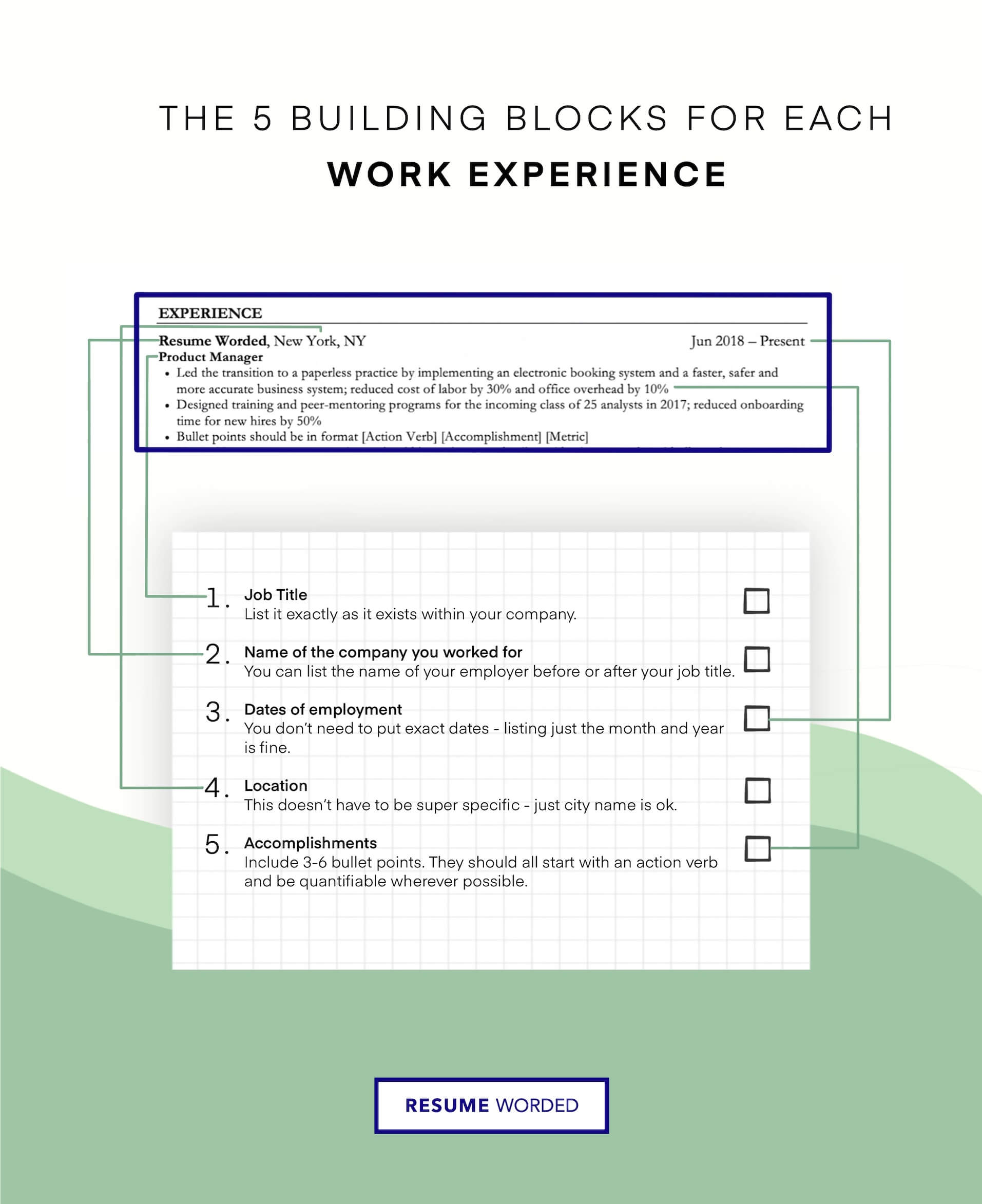
Skills you can include on your Entry Level Research Assistant resume
Template 11 of 11: psychology research assistant resume example.
If you have an interest in studying people’s psychology and behavior, a role as a psychology research assistant might be right for you. Psychology research assistants help conduct studies that test hypotheses about the human brain and behaviors. Using findings from the studies, you will help people by using the new data to choose suitable treatment plans for their psychological disorders. To land a job as an undergraduate research assistant, you’ll need a bachelor's degree in a technical field like statistics or a biology-related degree like abnormal psychology. Sometimes, a master's degree is required depending on where you want to work and your location. Extra credentials, such as a behavior analysis certification, can help you land this job more easily. Hiring managers will be looking for candidates with solid technical skills, a background in science, great writing abilities, and strong attention to detail.
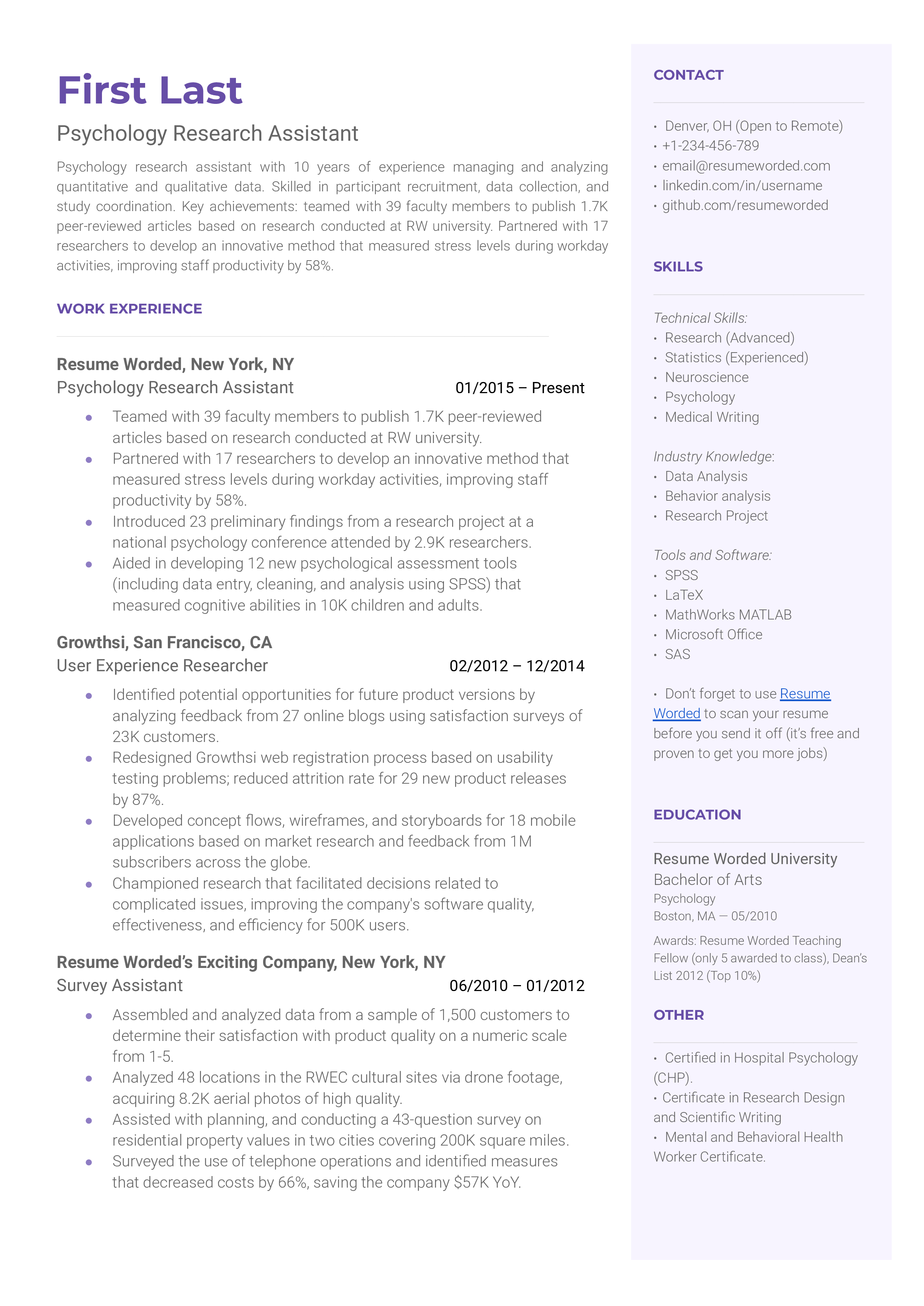
Tips to help you write your Psychology Research Assistant resume in 2024
obtain certification to broaden your opportunities as a psychology research assistant.
To get a psychology research assistant position, some workplaces may require a Board Certified Behavior Analyst (BCBA) certification. If you take a master's program in a relevant field, this certification is usually offered as a part of the degree. However, you do not need a master's degree to get this certification. A BCBA can be obtained through a standalone course. Taking this course, and obtaining your BCBA, can make you stand out among other applicants.
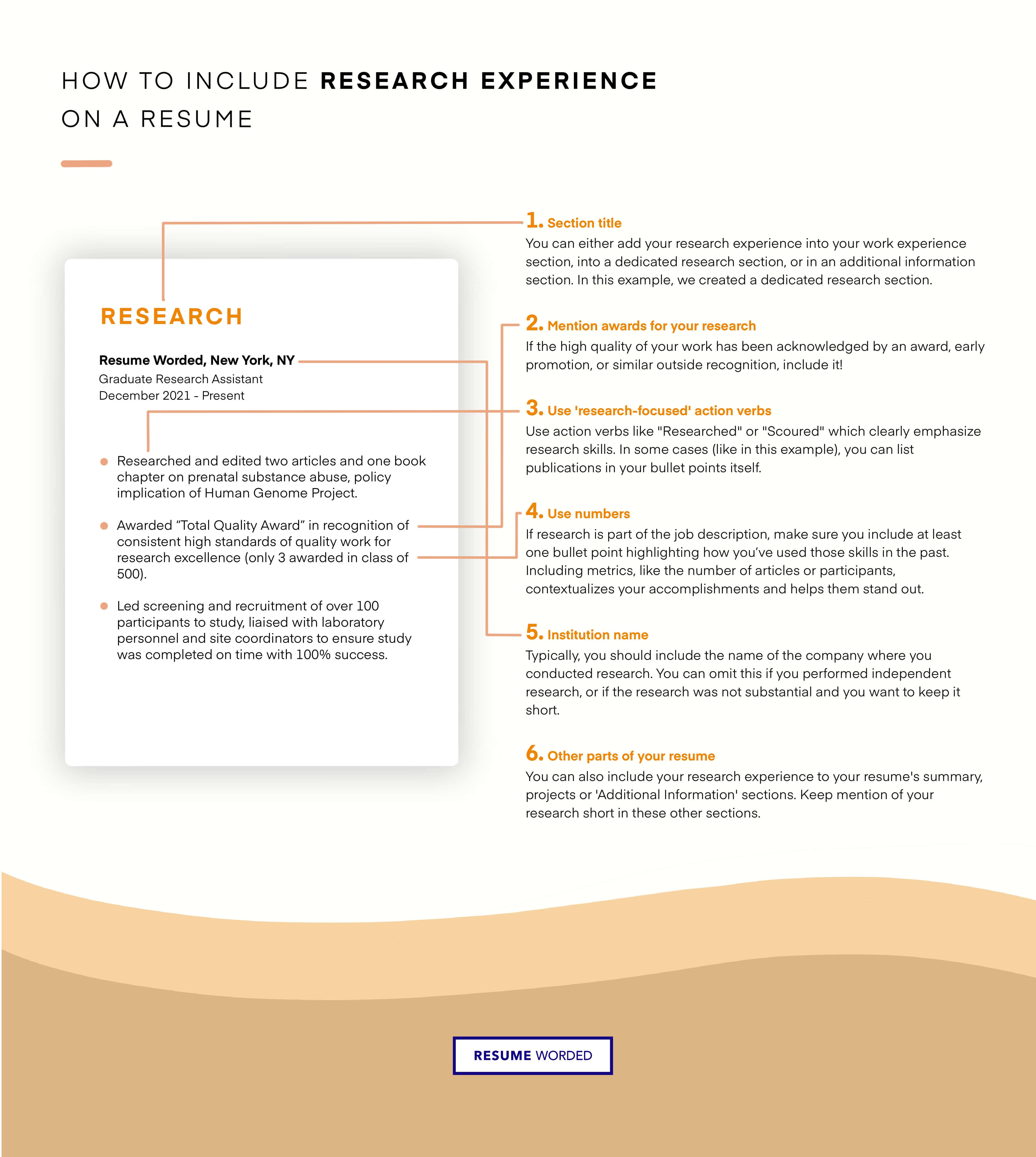
Highlight your crisis intervention skills
Though the role of a psychology research assistant is a very technical one, it also requires good foundations for counseling and interacting with a vulnerable population. Research assistants may be helping psychiatric patients through a crisis or traumatic events. To stand out, it’s important to show you have experience handling and de-escalating patients in a psychiatric setting.
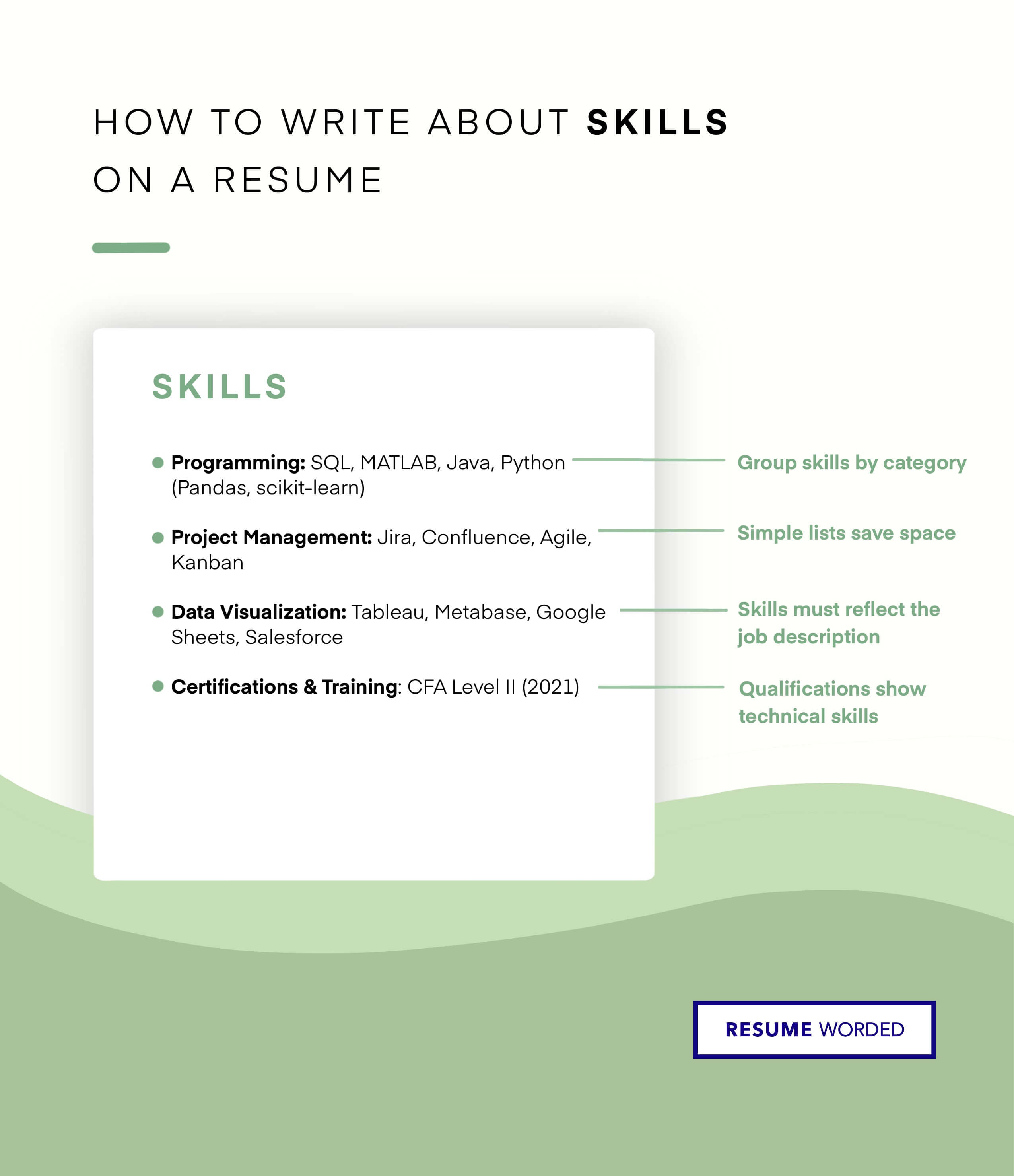
Skills you can include on your Psychology Research Assistant resume
We spoke with hiring managers at top research institutions, including Harvard University, Stanford University, and the National Institutes of Health, to gather their best tips for creating a strong research assistant resume. These tips will help you showcase your qualifications and stand out from other candidates in this competitive field.
Highlight your research experience
Hiring managers want to see that you have hands-on experience conducting research. Instead of simply listing your responsibilities, provide specific examples of your contributions to research projects.
- Conducted literature reviews and synthesized findings to support research on the impact of social media on adolescent mental health
- Collaborated with a team of researchers to design and implement a study on the effectiveness of a new drug treatment for Alzheimer's disease
Quantify your contributions whenever possible to give hiring managers a clear picture of your impact.
- Analyzed data from a survey of 500 participants using SPSS, resulting in the identification of key trends and insights
- Assisted in the preparation of 3 grant proposals, resulting in $500,000 in funding for the research project
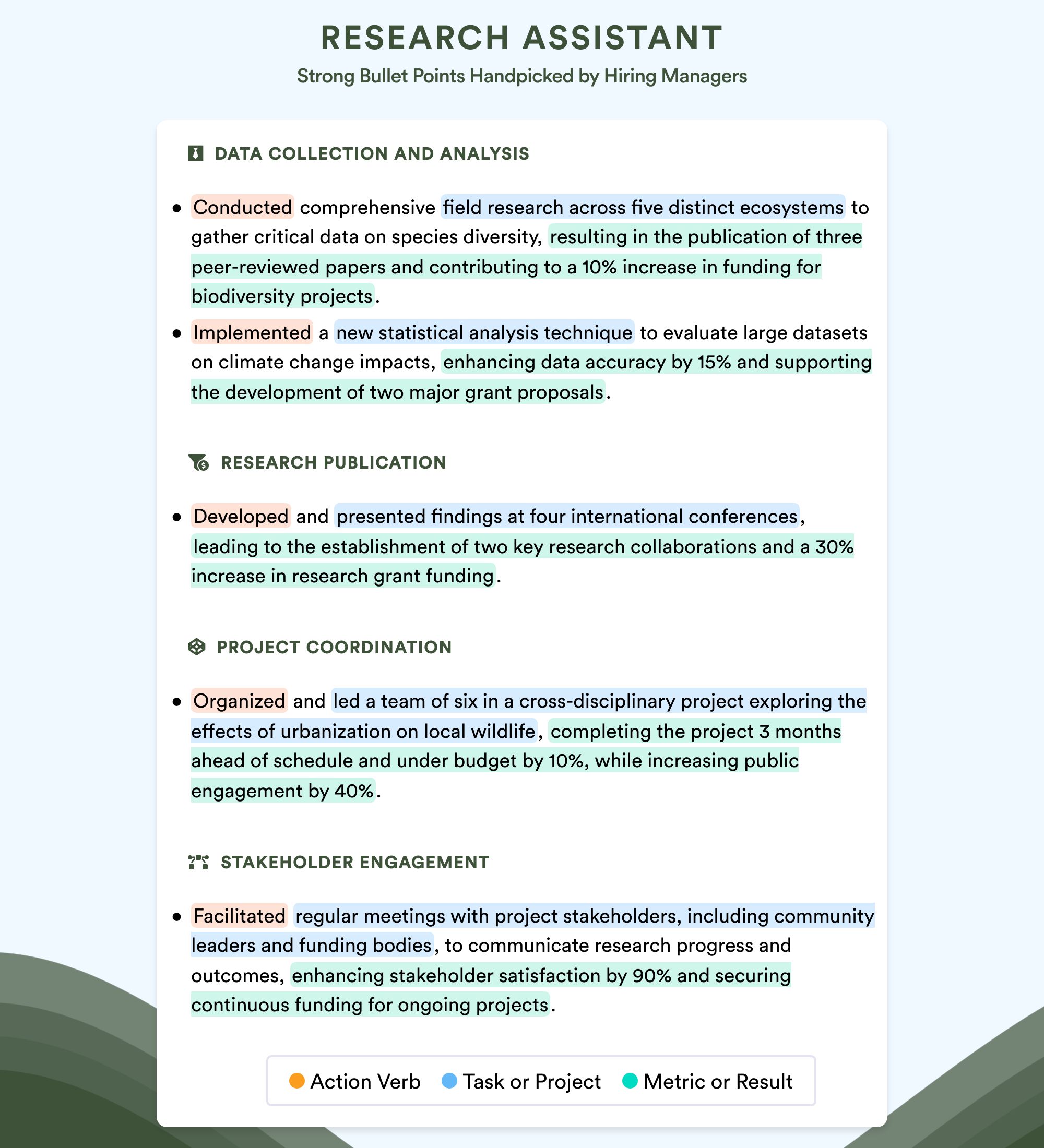
Showcase your technical skills
Research assistants often need a variety of technical skills, such as proficiency in statistical software, programming languages, or lab techniques. Make sure to highlight these skills on your resume.
- Familiar with research methods
- Experienced with data analysis
Instead, be specific about the tools and techniques you have used:
- Proficient in SPSS, R, and Python for statistical analysis and data visualization
- Skilled in using lab equipment such as PCR machines, microscopes, and centrifuges
If you have completed relevant coursework or training, include that as well to show your commitment to developing your technical skills.
Tailor your resume to the job description
Research assistant positions can vary widely depending on the field and the specific project. Carefully review the job description and tailor your resume to highlight the skills and experiences that are most relevant.
For example, if the job description emphasizes data analysis skills:
- Analyzed large datasets using R to identify patterns and trends in patient outcomes
- Created data visualizations using ggplot2 to communicate findings to research team and stakeholders
If the job description emphasizes lab skills:
- Conducted DNA extractions and PCR amplification on over 200 samples as part of a genetic study
- Maintained detailed lab notebooks and followed strict protocols to ensure accuracy and reproducibility of results
Include relevant projects and publications
If you have worked on research projects or contributed to publications, make sure to include them on your resume. This can help demonstrate your ability to contribute to the research process and communicate findings.
- Assisted in the development and execution of a study on the effects of mindfulness meditation on stress levels in college students
- Co-authored a paper published in the Journal of Experimental Psychology on the impact of sleep deprivation on cognitive performance
Even if you haven't been published, you can still include relevant projects such as:
- Designed and conducted an independent research project on the impact of social media use on body image in adolescent girls as part of a psychology course
- Collaborated with a team of classmates to develop a research proposal on the effectiveness of different teaching methods in STEM education
Highlight your communication and collaboration skills
Research assistants often work as part of a team and need to communicate effectively with colleagues, supervisors, and research participants. Highlight experiences that demonstrate your ability to work collaboratively and communicate complex ideas.
Skilled research assistant with experience collaborating with cross-functional teams to design and execute complex research projects. Adept at communicating findings to diverse audiences through presentations, reports, and visualizations.
Provide specific examples of how you have collaborated and communicated in your past experiences:
- Worked closely with a team of researchers from multiple disciplines to design a study protocol and coordinate data collection across three research sites
- Presented findings from a research project at a departmental symposium, fielding questions from faculty and graduate students
Show your attention to detail
Research assistants need to be detail-oriented to ensure the accuracy and integrity of research data. Highlight experiences that demonstrate your ability to work with precision and care.
Detail-oriented research assistant with strong organizational skills.
Instead, provide specific examples of how you have demonstrated attention to detail:
- Reviewed and cleaned data from patient surveys, ensuring accuracy and completeness of over 10,000 entries
- Developed and maintained detailed documentation of research protocols and data management procedures to ensure consistency and reproducibility
Attention to detail is also important when it comes to following research protocols and regulations. If you have experience with research ethics or compliance, make sure to highlight that as well.
- Completed training in responsible conduct of research and HIPAA compliance
- Assisted in the preparation and submission of IRB applications and ensured adherence to approved protocols throughout the research process
Writing Your Research Assistant Resume: Section By Section
header, 1. put your name on the first line.
Your name should be the most prominent element in your header, typically centered at the top of the page. Use a larger font size (18-24 points) than the rest of your resume text.
Avoid nicknames or abbreviations. Use the name you'd like to be called in the workplace, which is usually your full first and last name:
- Samantha Nguyen
- Carlos Ramirez, MBA
Don't make your name hard to read by using cursive, an overly stylized font, or a font color other than black:
- sAmAnTha nGuYeN
- CARLOS RAMIREZ
2. Include essential contact details
Just below your name, add key contact details so employers can easily get in touch with you. Essential details to include are:
- Phone number
- Professional email address
- LinkedIn profile URL
- City and state
Format your contact details concisely on one line, separated by vertical lines, bullets, or other dividers. For example:
- Los Angeles, CA | 555-123-4567 | [email protected] | linkedin.com/in/samantha-nguyen
- Atlanta, GA • 555-123-4567 • [email protected] • linkedin.com/in/carlosramirez
Don't include personal details or a full mailing address, which hiring managers don't need at this stage:
123 Oak St. Apt #201, Atlanta, GA 30308 | Born 05/17/1995 | Married, 2 kids | [email protected] | 555-123-4567 | linkedin.com/in/carlosramirez
3. Optionally include a job title
If you're targeting a specific research assistant job, consider adding the exact job title to your header to immediately communicate your career focus. For example:
Samantha Nguyen Clinical Research Assistant
However, only include a job title if you can match it exactly to the job posting. Otherwise, it may work against you by pigeon-holing you into one niche. When in doubt, leave it out and let your tailored resume content speak for itself.
Don't include subjective adjectives or buzzwords in your job title:
Carlos Ramirez Detail-Oriented Research Assistant with 5+ Years of Experience
Summary
A resume summary is an optional section that sits at the top of your resume, just below your name and contact information. It provides a brief overview of your professional background, skills, and career goals. While not required, a well-written summary can help you stand out to hiring managers by highlighting your most relevant qualifications and experiences.
When writing a summary for a research assistant position, focus on your research skills, academic background, and any relevant work experience. Tailor your summary to the specific job you're applying for by using keywords from the job description. Keep it concise and objective, avoiding buzzwords and focusing on measurable achievements.
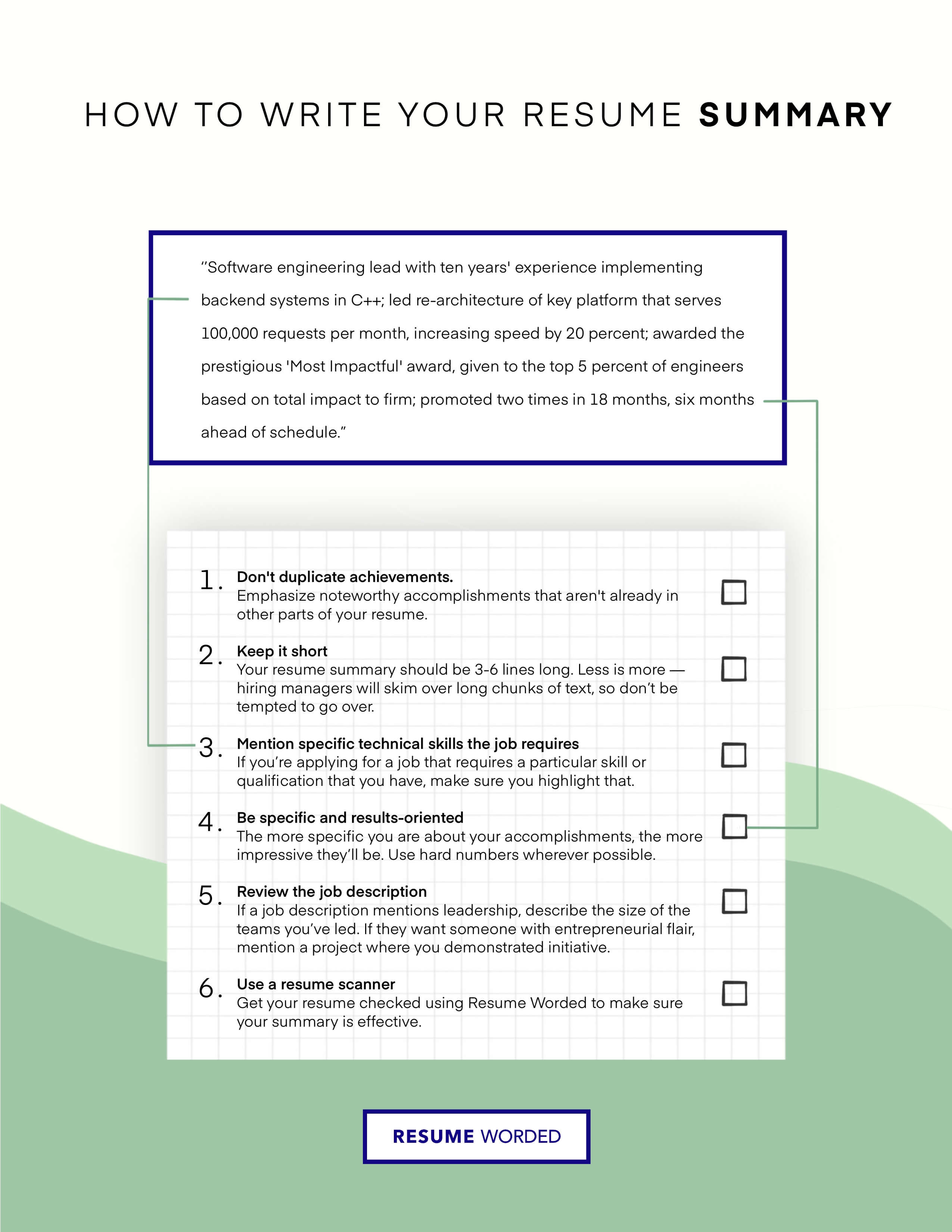
To learn how to write an effective resume summary for your Research Assistant resume, or figure out if you need one, please read Research Assistant Resume Summary Examples , or Research Assistant Resume Objective Examples .
1. Highlight your research skills and experience
When writing a summary for a research assistant position, it's crucial to showcase your research skills and experience. Mention specific research projects you've worked on, the methodologies you used, and any notable findings or outcomes.
- Research assistant with 2+ years of experience in qualitative and quantitative research methods, including survey design, data analysis, and report writing.
- Skilled in conducting literature reviews, managing databases, and presenting findings to cross-functional teams.
Avoid generic statements that don't provide concrete examples of your research abilities:
- Experienced researcher with a passion for learning.
- Hardworking and detail-oriented research assistant.
2. Tailor your summary to the job description
To make your summary more effective, tailor it to the specific research assistant position you're applying for. Review the job description carefully and identify the key skills, qualifications, and experience the employer is looking for. Then, incorporate those keywords and phrases into your summary.
Research assistant with a Master's in Psychology and experience in designing and conducting experiments on cognitive processes. Proficient in SPSS, R, and Qualtrics. Seeking to contribute to ABC University's research on decision-making and memory.
Avoid using a generic summary that could apply to any research assistant position:
Recent graduate with a degree in Psychology looking for a challenging research assistant position. Strong analytical and problem-solving skills.
3. Focus on your most relevant qualifications
When space is limited, focus on highlighting your most relevant qualifications for the research assistant role. This may include your educational background, specific research skills, or experience with particular tools and software.
- Bachelor's degree in Biology with coursework in statistics and research methods.
- Proficient in data collection, data cleaning, and statistical analysis using STATA and SAS.
- Experience with grant writing and manuscript preparation.
Avoid including irrelevant or outdated information that doesn't directly relate to the research assistant position:
- High school diploma from XYZ High School.
- Volunteer experience at local animal shelter.
- Proficient in Microsoft Word and PowerPoint.
Experience
Your work experience section is the heart of your research assistant resume. It's where you highlight your most relevant and impressive research projects, skills, and accomplishments. Hiring managers want to see that you have the right mix of technical and soft skills to excel in the role. Use these tips to make your work experience section stand out.

1. Highlight your research skills and methods
Research assistants need to be well-versed in various research methods and techniques. Showcase the specific research skills you've used in past roles, such as:
- Conducting literature reviews and synthesizing findings
- Designing and administering surveys and interviews
- Analyzing quantitative and qualitative data using statistical software like SPSS or NVivo
- Presenting findings through reports, presentations, and visualizations
By highlighting your research skills, you demonstrate to employers that you have the technical expertise to support their research projects.
Many research assistant roles require proficiency in specific tools or software. If a job description mentions particular tools, make sure to include them in your work experience bullet points if you have that experience. This will help your resume pass applicant tracking systems and catch the hiring manager's attention.
2. Quantify your impact with metrics
Whenever possible, use numbers and metrics to quantify the impact of your work. This helps employers understand the scope and significance of your contributions. For example:
- Conducted 25+ literature reviews to support grant proposals, resulting in $500K in awarded funding
- Analyzed survey data from 1,000+ respondents using SPSS to identify key trends and insights
- Co-authored 3 peer-reviewed journal articles published in top-tier publications
In contrast, vague bullet points without metrics are less impactful:
- Helped with literature reviews for grant proposals
- Used SPSS to analyze survey data
- Assisted with writing journal articles
If you're having trouble quantifying your bullet points, try using our free tool, Score My Resume . It analyzes your resume and provides specific feedback on how to strengthen your bullet points with metrics and active language.
3. Tailor your bullet points to the job description
Research assistant roles can vary widely depending on the field, institution, and project. To make your resume stand out, tailor your work experience bullet points to the specific requirements and responsibilities listed in the job description. For example, if a job posting emphasizes data visualization skills, you might include a bullet point like:
Created interactive Tableau dashboards to visualize research findings, resulting in enhanced stakeholder understanding and engagement
By aligning your bullet points with the job requirements, you demonstrate to employers that you have the specific skills and experience they're looking for.
To ensure your resume is well-tailored, try using our Targeted Resume tool. It analyzes your resume against a specific job description and provides recommendations on how to better align your skills and experience with the role.
4. Show progression and leadership
Employers value research assistants who can take on increasing responsibility and leadership over time. If you've progressed into higher-level roles or taken on leadership tasks, make sure to highlight that in your work experience section. For example:
- Promoted to Senior Research Assistant after one year, managing a team of 3 junior RAs
- Mentored and trained 5 incoming research assistants on lab protocols and best practices
- Led the development and implementation of a new data management system, improving efficiency by 30%
By showcasing your progression and leadership, you demonstrate your potential to grow and contribute at a higher level in the role.
If you're early in your research career and don't yet have formal leadership experience, think about times when you've taken initiative or ownership of projects. Even small examples of leadership, like training a new team member or suggesting process improvements, are worth including.
Education
Your education section shows hiring managers that you have the necessary knowledge and training for the research assistant role. It also gives them a sense of your background and expertise. Here are some tips to make your education section stand out:

1. Put your education section near the top
If you are a recent graduate or have limited work experience, put your education section above your work experience. This highlights your most relevant qualification for the research assistant job.
For example:
EDUCATION Bachelor of Science in Psychology, XYZ University, 2020 Relevant Coursework: Research Methods, Statistics, Cognitive Psychology
However, if you have several years of relevant work experience, move your education to the bottom. Keep it concise, like this:
EDUCATION M.A. Sociology, ABC University B.A. Anthropology, DEF College
2. Include relevant coursework and academic projects
Listing relevant courses and projects shows you have specific knowledge needed for the research assistant job. Include courses that relate to research methods, data analysis, or the subject area you would be researching.
For recent graduates, here is an example of how to list coursework:
B.A. in Sociology, 2021 University of XYZ Relevant Coursework: Social Research Methods, Statistics for Social Sciences, Qualitative Research Senior Thesis: "Factors Influencing Voter Turnout: An Analysis of County-Level Data"
For experienced candidates, only include advanced degrees and specialized coursework that is highly relevant and sets you apart.
3. Consider including select academic accomplishments
Academic awards, publications, or presentations demonstrate excellence and initiative. They can help you stand out, especially if you are an entry-level research assistant.
- Graduated Summa Cum Laude
- Dean's List, 8 semesters
- First Place, XYZ University Undergraduate Research Showcase
Be selective and only include the most impressive achievements. Don't list high school accomplishments or awards unrelated to research.
Action Verbs For Research Assistant Resumes
One of the easiest mistakes to make on your resume is listing the job duties for each position you held instead of focusing on your accomplishments. The best way to prevent this is to start each bullet point with a strong action verb. As a research assistant, you’ll want to choose verbs that highlight clinical, scientific, and technical skills. Use Tested or Analyzed to highlight your experience with running tests and performing data analysis, or Monitored and Documented to show attention to detail. If the position you’re applying for requires soft skills like teamwork and communication, choose verbs like Assisted and Supported to show how you’ve worked with senior researchers and academics, Supervised if you’ll be leading a team of research assistants, and Presented if the role required a lot of public speaking or outreach.

- Streamlined
- Interviewed
For a full list of effective resume action verbs, visit Resume Action Verbs .
Action Verbs for Research Assistant Resumes
Skills for research assistant resumes.
The skills you’ll need as a research assistant will depend on your field and the specific position you’re applying for. Clinical or laboratory positions will require more technical and scientific skills, while academic or market research positions may place a heavier emphasis on soft skills that don’t need to be listed in your skills section. To find out what hard skills you should be including on your resume, the best place to start is the job description itself. Pick out the most important skills from there and make sure to list the ones you have. For more comprehensive suggestions, you can check out our list of top resume skills and keywords or use our free Targeted Resume tool for keyword suggestions and personalized feedback on how to improve your resume.
- Python (Programming Language)
- R (Programming Language)
- Machine Learning
- C (Programming Language)
- Data Analysis
- Microsoft Access
- Deep Learning
- Computer Vision
- Programming
- Molecular Biology
- Biochemistry
- Cell Biology
- Cell Culture
- Econometrics
- Microbiology
How To Write Your Skills Section On a Research Assistant Resumes
You can include the above skills in a dedicated Skills section on your resume, or weave them in your experience. Here's how you might create your dedicated skills section:

Skills Word Cloud For Research Assistant Resumes
This word cloud highlights the important keywords that appear on Research Assistant job descriptions and resumes. The bigger the word, the more frequently it appears on job postings, and the more 'important' it is.

How to use these skills?
Resume bullet points from research assistant resumes.
You should use bullet points to describe your achievements in your Research Assistant resume. Here are sample bullet points to help you get started:
Created and maintained models for M&A plans, Discounted Cash Flow Analysis, Product SVA Analysis, Credit Risk Assessment Models, and Common Stock Liquidity Comparisons
Conducted private equity due diligence in $400M portfolio. Performed strategic and analytical valuation of assets based on interviews with experts and created extensive models of the industries; persuaded client to move forward with acquisition
Created economic model to assess financial feasibility and operational synergies throughout the supply chain; identified >$50M in savings
Generated Excel models which produced risk-weighted composite valuation scores of country and sectors based on quantitative signals
Designed merchandising strategies for grocery retailers based on regression analysis identifying key store attributes to increase traffic and conversion; resulted in a 25% sales lift
For more sample bullet points and details on how to write effective bullet points, see our articles on resume bullet points , how to quantify your resume and resume accomplishments .
Other Research & Science Resumes
Makeup artist.
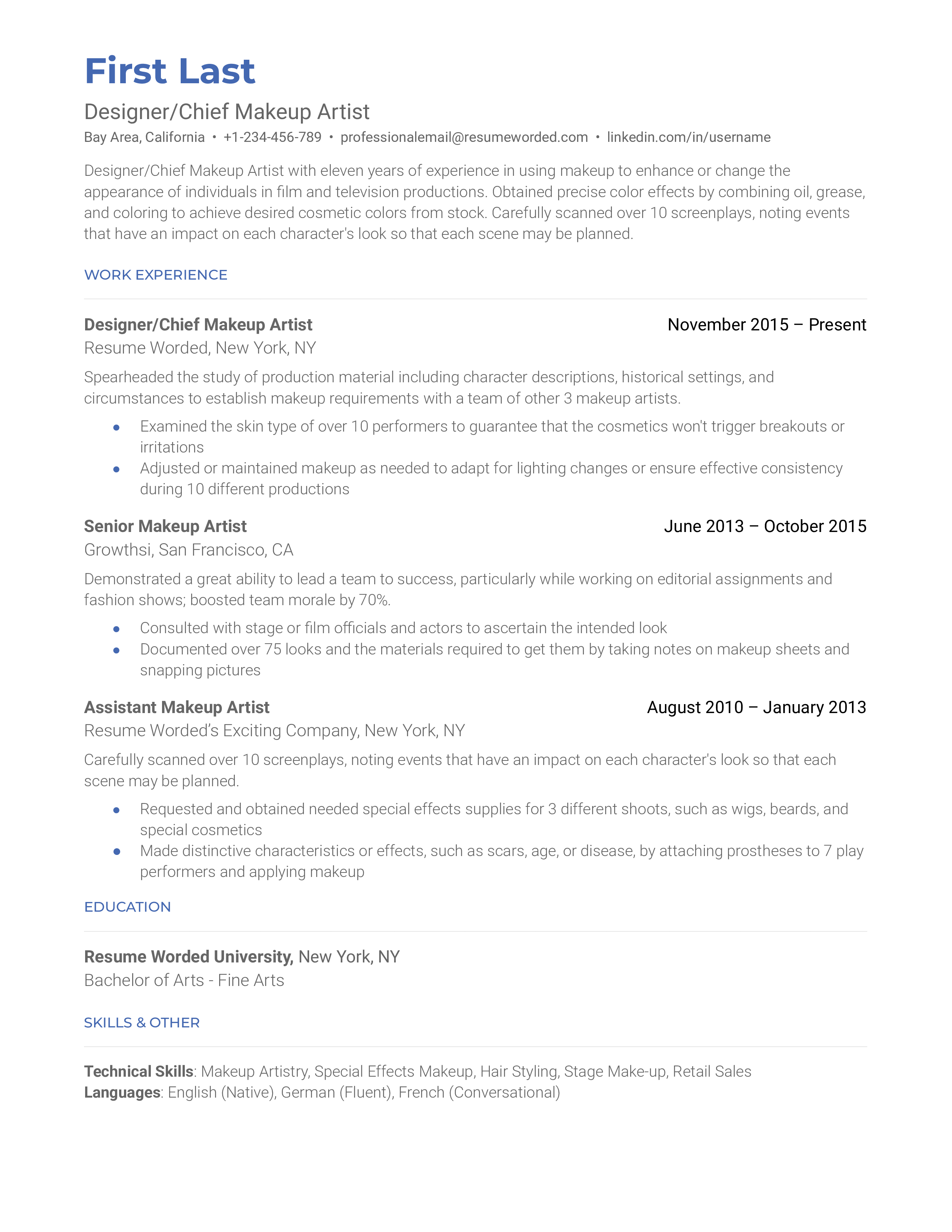
Policy Analyst
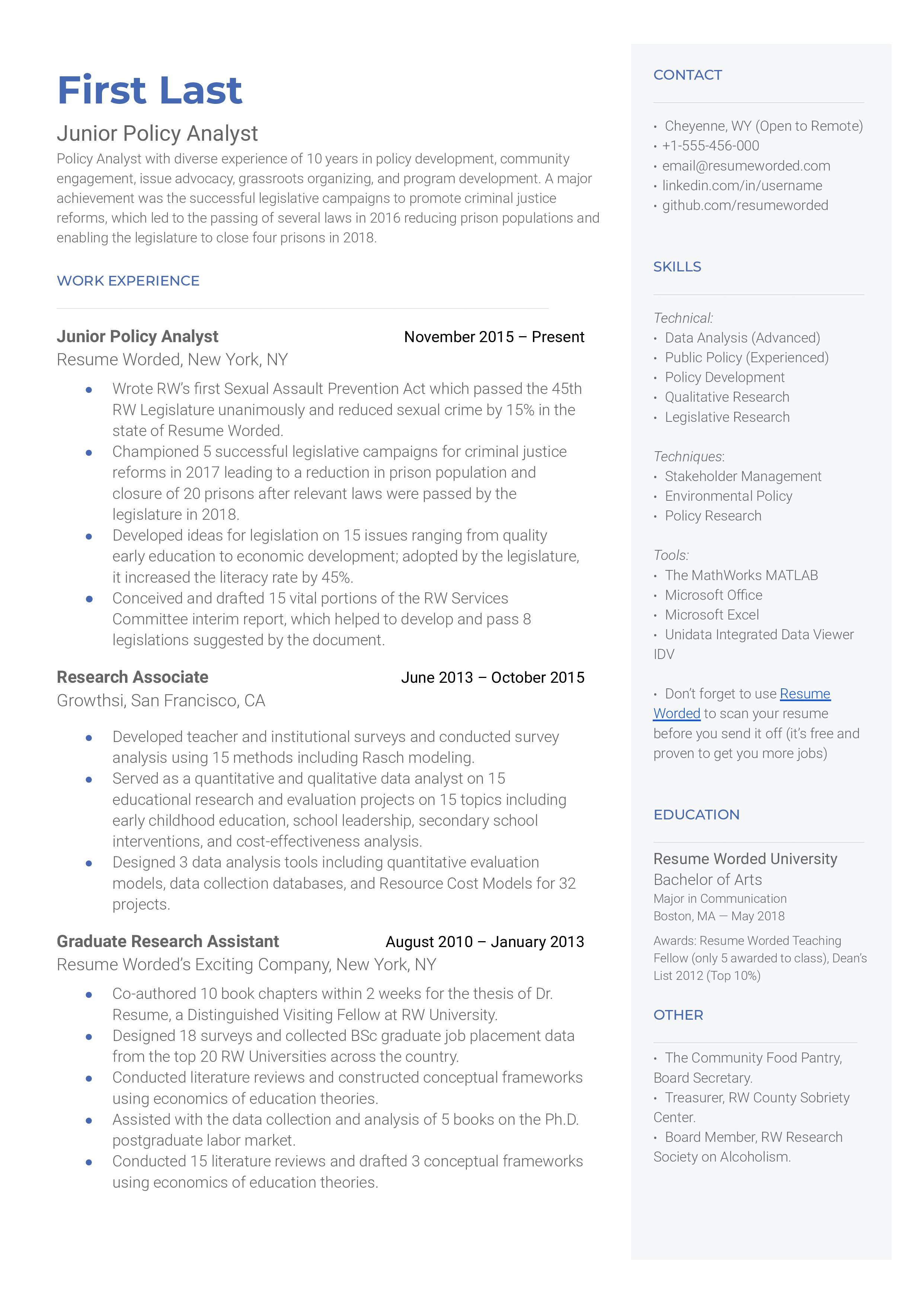
Warehouse Manager
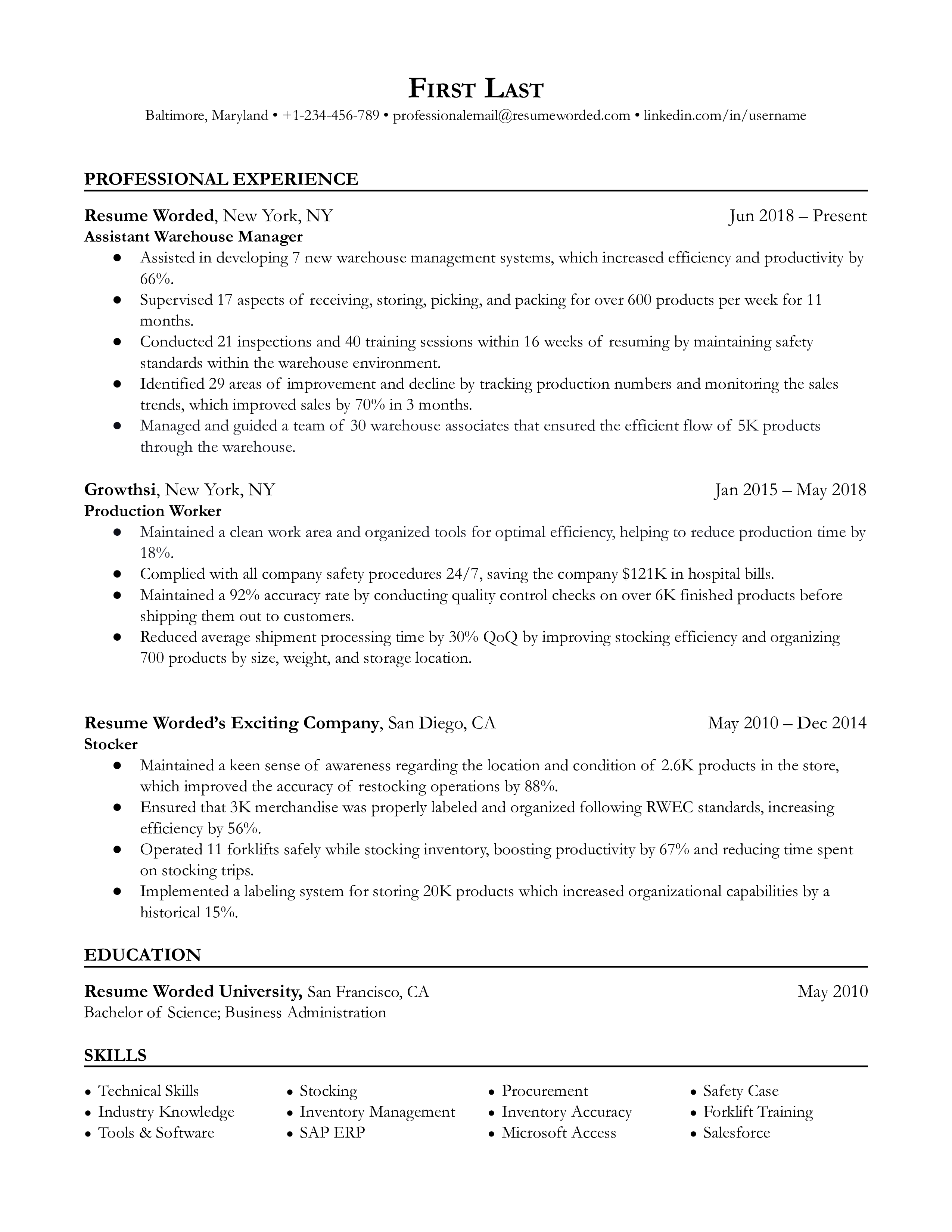
- Chemistry Resume Guide
Research Assistant Resume Guide
- Quality Control Resume Guide
- Clinical Research Resume Guide
- Environmental Scientist Resume Guide
- Health and Safety Resume Guide
- Research Assistant Resume Example
- Clinical Research Assistant Resume Example
- Laboratory Research Assistant Resume Example
- Graduate Research Assistant Resume Example
- Undergraduate Research Assistant Resume Example
- Entry Level Research Assistant Resume Example
- Psychology Research Assistant Resume Example
- Tips for Research Assistant Resumes
- Skills and Keywords to Add
- Sample Bullet Points from Top Resumes
- All Resume Examples
- Research Assistant CV Examples
- Research Assistant Cover Letter
- Research Assistant Interview Guide
- Explore Alternative and Similar Careers
Download this PDF template.
Creating an account is free and takes five seconds. you'll get access to the pdf version of this resume template., choose an option..
- Have an account? Sign in
E-mail Please enter a valid email address This email address hasn't been signed up yet, or it has already been signed up with Facebook or Google login.
Password Show Your password needs to be between 6 and 50 characters long, and must contain at least 1 letter and 1 number. It looks like your password is incorrect.
Remember me
Forgot your password?
Sign up to get access to Resume Worded's Career Coaching platform in less than 2 minutes
Name Please enter your name correctly
E-mail Remember to use a real email address that you have access to. You will need to confirm your email address before you get access to our features, so please enter it correctly. Please enter a valid email address, or another email address to sign up. We unfortunately can't accept that email domain right now. This email address has already been taken, or you've already signed up via Google or Facebook login. We currently are experiencing a very high server load so Email signup is currently disabled for the next 24 hours. Please sign up with Google or Facebook to continue! We apologize for the inconvenience!
Password Show Your password needs to be between 6 and 50 characters long, and must contain at least 1 letter and 1 number.
Receive resume templates, real resume samples, and updates monthly via email
By continuing, you agree to our Terms and Conditions and Privacy Policy .
Lost your password? Please enter the email address you used when you signed up. We'll send you a link to create a new password.
E-mail This email address either hasn't been signed up yet, or you signed up with Facebook or Google. This email address doesn't look valid.
Back to log-in
These professional templates are optimized to beat resume screeners (i.e. the Applicant Tracking System). You can download the templates in Word, Google Docs, or PDF. For free (limited time).
access samples from top resumes, get inspired by real bullet points that helped candidates get into top companies., get a resume score., find out how effective your resume really is. you'll get access to our confidential resume review tool which will tell you how recruiters see your resume..

Writing an effective resume has never been easier .
Upgrade to resume worded pro to unlock your full resume review., get this resume template (+ 10 others), plus proven bullet points., for a small one-time fee, you'll get everything you need to write a winning resume in your industry., here's what you'll get:.
- 📄 Get the editable resume template in Google Docs + Word . Plus, you'll also get all 10 other templates .
- ✍️ Get sample bullet points that worked for others in your industry . Copy proven lines and tailor them to your resume.
- 🎯 Optimized to pass all resume screeners (i.e. ATS) . All templates have been professionally designed by recruiters and 100% readable by ATS.
Buy now. Instant delivery via email.
instant access. one-time only., what's your email address.

I had a clear uptick in responses after using your template. I got many compliments on it from senior hiring staff, and my resume scored way higher when I ran it through ATS resume scanners because it was more readable. Thank you!

Thank you for the checklist! I realized I was making so many mistakes on my resume that I've now fixed. I'm much more confident in my resume now.

Research Assistant CV example

Build your CV on this template

Flexible hours, varied projects and invaluable experience? There’s no wonder you’re looking for a role as a research assistant.
But if you want to land the best jobs, you’re going to need to show off your qualifications and research skills on a professional CV.
This in-depth writing guide will explain how to create a CV that lands interviews and secures you the role you want.
It also includes an example research assistant CV, to give you a better idea of how to present your information.
Article contents
Research assistant cv example.

CV templates

Before setting pen to paper, take a good look over the CV example above to get familiar with the structure, layout and format of a professional CV.
This applicant’s relevant research experience, skill and qualifications jump out of the page, allowing their suitability to shine through at a glance.
Research assistant CV structure & format
The format and structure of your CV are important because they will determine how easy it is for recruiters and employers to read your CV.
If they can find the information they need quickly, they’ll be happy; but if they struggle, your application could be overlooked.
A simple and logical structure will always create a better reading experience than a complex structure, and with a few simple formatting tricks, you’ll be good to go.
Check them out below:

Formatting Tips
- Length: If you want to hold the reader’s attention, it’s best to stick to two sides of A4 or less . This is more than enough room to highlight why you’re a good match for the role – anything more can quickly become tedious!
- Readability: Columns, lists, bullet points, bold text and subtle colour can all help to aid the readability of your CV. Your overarching goal should be to make the content as easy to read and navigate as possible, whilst also aiming to make your key skills and achievements stand out.
- Design: Your CV needs to look professional, sleek and easy to read. A subtle colour palette, clear font and simple design are generally best for this, as fancy designs are often harder to navigate.
- Avoid: Logos, profile photos or other images aren’t necessary and rarely add any value – save the space for written content, instead!

Build your CV now
Structuring your CV
Head your CV into the following sections:
- Name and contact details – Always start with these, so employers know exactly how to get in touch with you.
- CV profile – Add a short summary of your relevant experience, skills and achievements, which highlights your suitability.
- Core skills section – A 2-3 columned list of your key skills.
- Work experience – A detailed list of any relevant work experience, whether paid or voluntary.
- Education – An overview of your academic background and any training you may have completed.
- Hobbies + Interests – A brief overview of your hobbies and interests, if they’re relevant (optional).
Next, I’ll talk you through what type of content you should include in each of the CV sections above.
CV Contact Details

Start off your CV with a basic list of your contact details.
Here’s what you should include:
- Mobile number
- Email address
- Location – Share your town or city only; there’s no need for a full address.
- LinkedIn profile – Make sure the information on your profile is up-to-date and complete.
Quick tip : Delete excessive details, such as your date of birth or marital status. Recruiters don’t need to know this much about you, so it’s best to save the space for your other CV sections.
Research assistant CV Profile
Grab the reader’s attention by kickstarting your CV with a powerful profile (or personal statement , if you’re a graduate applicant).
This is a short introduction paragraph which summarises your most relevant skills, knowledge and experience.
It should sum up why you’d make a great fit for the role and entice recruiters to read through the rest of your CV.

Tips to consider when creating your profile:
- Avoid clichés: “Determined team player who always gives 110%” might seem like a good way to fill up your CV profile, but generic phrases like this won’t land you an interview. Recruiters hear them time and time again and have no real reason to believe them. Pack your profile with your hard skills and tangible achievements instead.
- Keep it short: Recruiters are busy, so to ensure your profile is actually read, it’s best to keep it short and snappy. 3-5 punchy lines makes for the perfect profile length.
- Research your target role: When recruiters spot a generic CV, they chuck it straight into the bin. The CV should closely match the essential requirements listed in the job ad, so make sure to review them before you write your CV profile.
- Ditch objectives: You only have a short space for your CV profile, so avoid writing down your career goals or objectives. If you think these will help your application, incorporate them into your cover letter instead.
What to include in your research assistant CV profile?
Research experience – Start by providing a snappy overview of any relevant research experience so far, focusing on showcasing any experience within the field you’re applying for. Discuss how many years experience you have, what areas of expertise and subject knowledge you’ve gained and what type of projects you’ve worked on.
Key skills – Whether it’s statistical methods or using specialist equipment, make sure your profile is packed with your key sector skills. Remember to tailor these to what’s listed in the job requirements and aim to match yourself up as closely as you can.
Qualifications – An academic undergraduate degree or higher in a relevant field is often a requirement for research roles, so remember to highlight yours early on in your profile, along with any other relevant sector qualifications.
Achievements – Whether it’s an academic award, a publication or a particularly impressive exam result in a relevant subject, try to incorporate some of your most relevant and impressive achievements into your profile.
Quick tip: Even the best of writers can overlook typos and spelling mistakes – to avoid them, use our quick-and-easy CV Builder to add expert pre-written content to your CV, provided by our team of recruitment experts.
Core skills section
Underneath your profile, create a core skills section.
It should be made up of 2-3 columns of bullet points of your relevant skills .
Before you do this, look over the job description and make a list of any specific skills, specialisms or knowledge required.
Then, make sure to use your findings on your list. This will paint you as the perfect match for the role.

Work experience/Career history
Now that recruiters have a good overview of your skills and abilities, you need to jump into the detail of your career history.
Give them a more thorough insight into what you can do by creating a detailed list of your relevant research assistant experience.
Start with your current role, and work backwards through all the relevant positions you’ve held.
This could be freelance, contract or voluntary work too; as long as it’s related to the role you’re applying for.
Quick tip: If you’re applying as a graduate and have limited work experience, it might be beneficial to flip the CV sections around and detail your education before your work experience, as this is what recruiters will be most interested in.

Structuring your roles
If you don’t pay attention to the structure of your career history section, it could quickly become bulky and overwhelming.
Get in recruiter’s good books by creating a pleasant reading experience, using the 3-step structure below:

Provide a brief overview of the job or project as a whole, what your role entailed and what type of company/institution you worked for.
“Worked within the academic researcher team at my University; responsible for preparing research papers and presenting findings at academic meetings.”
Key responsibilities
Use bullet points to detail the key responsibilities of your role, highlighting hard skills and specialist knowledge wherever you can.
- Learnt and up kept all laboratory and compliance requirements throughout experiments.
- Analysed data and and visualised data using fact sheets, graphs and tables.
- Submitted high-quality manuscripts to established journals for submission online and in print.
Key achievements
Round up each role by listing 1-3 key achievements , accomplishments or results.
Wherever possible, quantify them using hard facts and figures, as this really helps to prove your value.
- Carried out in-depth research into 10 unique projects and added over 2000 records per project to the database.
- Increased accuracy of transmission projects by 45%.
Although there should be mentions of your highest and most relevant qualifications earlier on in your CV, save your exhaustive list of qualifications for the bottom.
If you’re an experienced candidate, simply include your higher qualifications, such as your degree or masters.
However, less experienced candidates can provide a more thorough list of qualifications, including A-Levels and GCSEs.
If you’re an undergraduate or recent graduate, you should also dedicate more space to your degree, discussing relevant exams, assignments and modules in more detail.
Interests and hobbies
Although this is an optional section, it can be useful if your hobbies and interests will add further depth to your CV.
Interests that show valuable transferable skills and capabilities, such as volunteering, being the president of a University committee, fundraising or being part of a sport’s team, are well worth listing.
On the other hand, generic hobbies like ‘going out with friends’ won’t add any value to your application, so are best left off your CV.
Essential skills for your research assistant CV
Remember to tailor your research assistant skills to the specific roles you’re applying for — however, some of the core skills necessary include:
Subject knowledge – Strong knowledge and a passion for your specific subject area.
Lab techniques – Knowledge and familiarity with the required scientific methods, lab techniques and equipment used.
Report writing – Preparing and writing reports to present findings.
Data analysis – Collecting, processing and analysing project data.
Numerical skills – Advanced mathematical ability.
Health + safety – Ability to adhere to health and safety + infection control regulations.
Writing your research assistant CV
When putting together your research assistant CV, there are a few key points to remember.
Always tailor your CV to the target role, even if it means creating several versions for different roles.
Additionally, remember that the structure and format of your CV need just as much attention as the content.
Remember to triple-check for spelling and grammar errors before hitting send, as even minor errors could be a disadvantage.
Good luck with your job search!
More Scientific CV examples
- Astronaut CV
- Clinical Data Manager CV
- Clinical Research Associate CV (CRA)
- Clinical Trial Assistant CV
- Embryologist CV
- Epidemiologist CV
- Food Scientist CV
- Formulation Scientist CV
- Lab Assistant CV
- Lab Manager CV
- Lab Technician CV
- Medical Writer CV
- Neuroscience CV
- Political Scientist CV
- Research Manager CV
- Research Scientist CV
- Researcher CV
11 Research Assistant Resume Examples for 2024
A good research assistant resume is key to landing your next job. In this article, you will find proven resume examples and get strategic advice. We cover resume formatting, key skills to highlight, and what to avoid. Our tips come from hiring managers in the field.

- 04 Dec 2024 - 1 new section (Showcase leadership growth) added
- 04 Dec 2024 - 1 new resume template (Research Associate in Pharmaceutical Industry) added
- 07 Nov 2024 - 1 new section (Showcase leadership and growth) added
Next update scheduled for 12 Dec 2024
Here's what we see in the best resumes for this role
Show Impact With Numbers : Use metrics to show your impact like increased time savings by 15% , reduced customer support issues by 20% , boosted data accuracy by 25% , or analyzed 10,000+ records .
Include Skills Listed In The Job Description : Include skills on your resume that you have and are mentioned on the job description. Some popular ones are SPSS , Python , data analysis , survey design , statistical software . Choose the ones you have and are mentioned in the JD.
Importance Of Relevant Experience : Relevant experience matters. Use phrases like conducted literature reviews or managed databases . Tailor these to the job.
use this maybe to have a resume upload button widget 1: yellow Here's a short quick tip / warning for people to include. If your symptoms get worse or do not improve after 1 day, go to a lower altitude if you can. Try to go around 300 to 1,000 metres lower.
widget 2: red / but not serious Here's a short quick tip / warning for people to include. If your symptoms get worse or do not improve after 1 day, go to a lower altitude if you can. Try to go around 300 to 1,000 metres lower.
helpful blue / but not serious Here's a short quick tip / warning for people to include. Here's a short quick tip / warning for people to include. Here's a short quick tip / warning for people to include. Here's a short quick tip / warning for people to include. Here's a short quick tip / warning for people to include. Here's a short quick tip / warning for people to include. Here's a short quick tip / warning for people to include.
Research Assistant Resume Sample
Find out how good your resume is.
ummm here it is
Get instant feedback on your resume
Want to know if your resume stands out for research assistant positions? Our AI-powered tool evaluates your resume based on key criteria that hiring managers in the research field look for. You'll get a clear score and specific feedback to improve your chances of landing interviews.
Upload your resume now for a free, unbiased assessment. Our tool will show you how to make your research skills and experience shine, helping you take the next step in your career.
Place education strategically
When you're applying as a research assistant, having the right education is vital. List it prominently if you're a new graduate or still studying. Show your most relevant degrees near the top of your resume. This lets hiring managers see your academic background quickly, which is key in a research role.
If you have been working in the field, your work experience should come first. But, if you've recently finished an important degree like a master's, put your education ahead of experience to explain your recent focus. Remember, degrees related to the field such as biology, psychology, or statistics, are essential to mention for a research assistant role.
Highlight relevant skills
Emphasize skills like data analysis, statistical software proficiency, and writing reports. These are key for research or assistant roles.
Mention any research projects or academic papers you have worked on. This shows your hands-on experience in the field.
Data Analyst Resume Sample
Ideal resume length.
As a hiring manager, I recommend that you keep your resume as a research assistant concise. You should aim for one page if you have less than 10 years of relevant experience. Make sure you clearly show your main qualifications and experiences that relate specifically to research assistance. If you have a broader range of experiences or are applying for a senior position, then up to two pages can be appropriate to detail your career journey.
Remember, good resumes focus on relevance and clarity. Highlight key projects and accomplishments rather than listing all past tasks. Emphasize skills like data collection, analysis, or any specialized knowledge you have relevant to your field of research. Prioritize information and avoid dense blocks of text to improve readability. A clear, well-organized resume will always stand out more than one that tries to include too much.
Senior Researcher Resume Sample
Showcase detail-oriented work.
Provide examples of tasks where attention to detail was important. Include tasks like data cleaning or managing large datasets.
Mention any experience with quality control or maintaining accurate records. Employers value precision in research.
Research Assistant with Molecular Biology Specialization Resume Sample
Understanding resume screeners.
When you apply for a research assistant job, your resume might first be read by a computer program called an Applicant Tracking System (ATS). This is a tool that hiring managers use to sort through many resumes quickly. To make sure your resume stands out, you need to know how these systems work.
Here are some tips to help your resume get noticed by both the ATS and the hiring manager:
- Use keywords from the job description. For example, if the job posting mentions 'data collection', make sure you mention your experience with data collection in your resume.
- Keep your resume format simple. Use clear headings and bullet points. Avoid tables and graphics, as these can confuse the ATS.
Remember, a good resume shows your experience with research methods and attention to detail. Follow these tips to increase your chances of getting to the next step in the hiring process.
Aspiring Research Assistant Resume Sample
Tailor your resume details.
To grab a hiring manager's attention, you need to show how your skills match the research assistant role. This means choosing the right details to include that talk about your direct experience. Make sure each point you make relates to the tasks and knowledge you’ll need for the job.
- List any specific research methods or tools you have used, like qualitative data analysis or SPSS software .
- Show your organization skills by mentioning any large data sets you've managed or complex projects you've supported.
- If you're new to research roles, link your past work to skills needed for research. For example, you might include experience with data collection in a different setting.

Clinical Research Coordinator Resume Sample
Essential skills for research roles.
When you're applying for a research assistant position, your resume should highlight the technical skills that show your ability to assist in detailed and complex research tasks. Here are some skills you might include:
- Data analysis
- Statistical software
- Laboratory techniques
- Scientific writing
- Research methodologies
- Data collection
- Quantitative research
- Qualitative analysis
- Bibliographic software
- Experimental design
You don't need to have every skill listed here. Focus on the ones you are good at and that match the job you want. Many research jobs look for specific skills. For example, a lab-based role might require strong laboratory techniques , while a market research position might value data analysis and statistical software expertise.
Include these skills in a dedicated section on your resume. This makes it easy for hiring managers to see your abilities quickly. Also, since many companies use Applicant Tracking Systems (ATS), having a clear skills section can help your resume get noticed by these systems. Always tailor your skills to each job application based on the job description and required expertise.
Senior Academic Research Specialist Resume Sample
Showcase leadership growth.
If you have ever led a project or been promoted, it's important to show this on your resume. Employers want to see that you can take charge and excel in your role. Here are ways you can do this:
- Detail any projects where you were in charge. Use phrases like 'Led a team of 5 in a research project' to show your leadership.
- Point out any time you trained new staff or interns. This is a good sign of leadership. For example, 'Trained 3 new interns in data collection and analysis.'
Even if you're not sure if you have leadership experience, think about times when you took the lead on a task or helped others. You might have more experience than you think.
Senior Healthcare Research Analyst Resume Sample
Quantify your research impact.
When you apply for a research assistant position, showing your impact with numbers can make your resume stand out. Numbers help employers see the value you can bring to their team. Here are some ideas to help you think about metrics:
- Think about the size of the projects you worked on. How many people were in the study? For example, you might say 'Assisted with a study involving 300 participants.'
- Consider any improvements you helped achieve. Did your work help to reduce the time needed for data collection? You could write, 'Helped reduce data collection time by 20% through a streamlined process.'
Always try to use numbers to show how you made a difference in your past roles. For instance:
- Did you help write a research paper? Mention 'Contributed to 2 published papers.'
- Have you developed or improved any research methods? You might include 'Developed a new survey method that increased response rates by 15% '.
- If you managed budgets, specify the amount, like 'Managed a research budget of $10,000 '.
- Mention how many tasks or experiments you ran, such as 'Conducted over 100 laboratory experiments.'
- If your work led to cost savings, quantify it, 'Identified supplier inefficiencies, saving the project an estimated $5,000 annually.'
- For team projects, indicate your role and the outcome, 'Played a key role in a team that improved research accuracy by 25% '.
Use these recommendations to think through your experience and include numbers that show your impact as a research assistant.
Environmental Research Consultant Resume Sample
Showcase leadership and growth.
When you're looking to make a strong impression as a research assistant, highlighting any leadership roles or promotions you've had is key. It shows you're capable of taking on more responsibility and growing within a role. Here are some ways you can show this:
- Include any titles or roles that demonstrate leadership, such as 'lead researcher' or 'project coordinator'. Even if these roles were part of a class or volunteer work, they count.
- Mention specific projects where you had a leading role or where your work led to a promotion. For example, 'Promoted to senior research assistant after leading a successful data collection initiative'.
Think about tasks that required leadership skills, such as training new team members, organizing meetings, or managing a part of the project. Use bullet points to make these stand out. For instance:
- Trained 5 new assistants on research protocols and data entry, improving team efficiency by 20%.
- Managed a research project timeline, ensuring milestones were met ahead of schedule.
- Entry-Level Administrative Assistant Resume Examples
- Entry-Level Dental Assistant Resume Examples
- Entry-Level Nursing Assistant Resume Examples
- Digital Marketing Assistant Resume Examples
- Assistant Operations Manager Resume Examples
- Special Education Teacher Assistant Resume Examples
- Virtual Assistant Resume Examples
- Assistant Retail Manager Resume Examples
Quick links
Research assistant, resume sample #1, resume sample #2, resume sample #3, data analyst, resume sample #4, senior researcher, resume sample #5, research assistant with molecular biology specialization, resume sample #6, aspiring research assistant, resume sample #7, clinical research coordinator, resume sample #8, senior academic research specialist, resume sample #9, senior healthcare research analyst, resume sample #10, environmental research consultant, resume sample #11, additional resources, questions get in touch.
